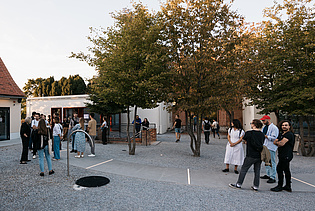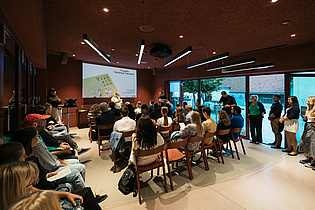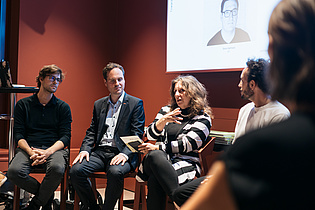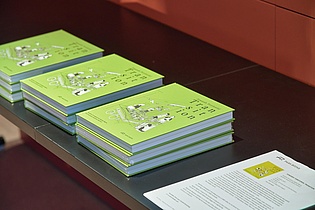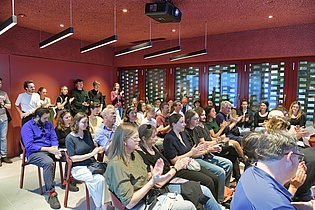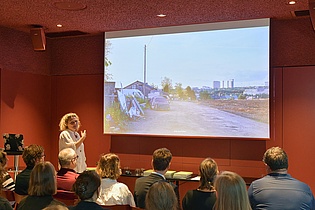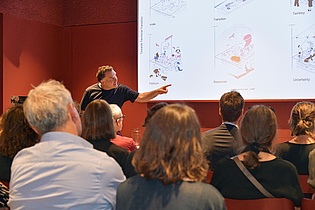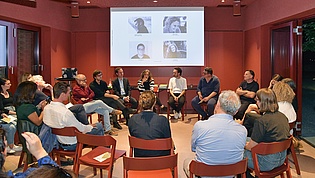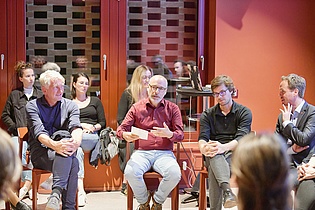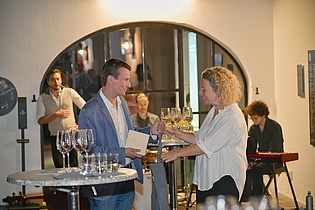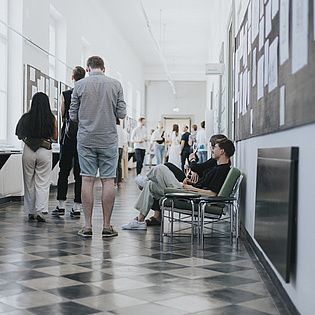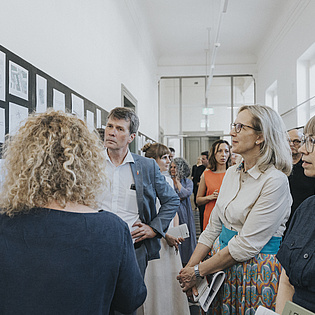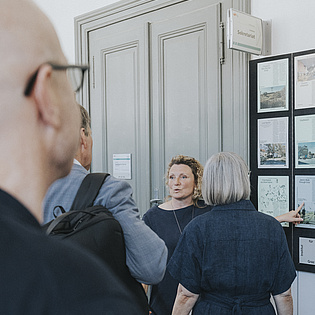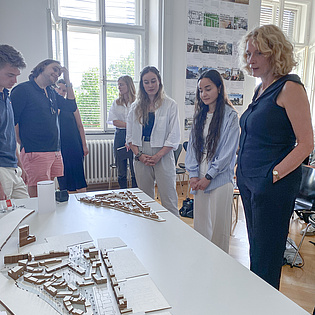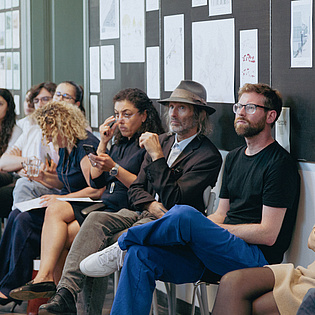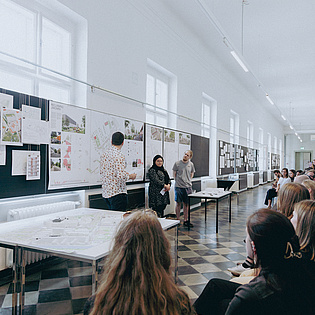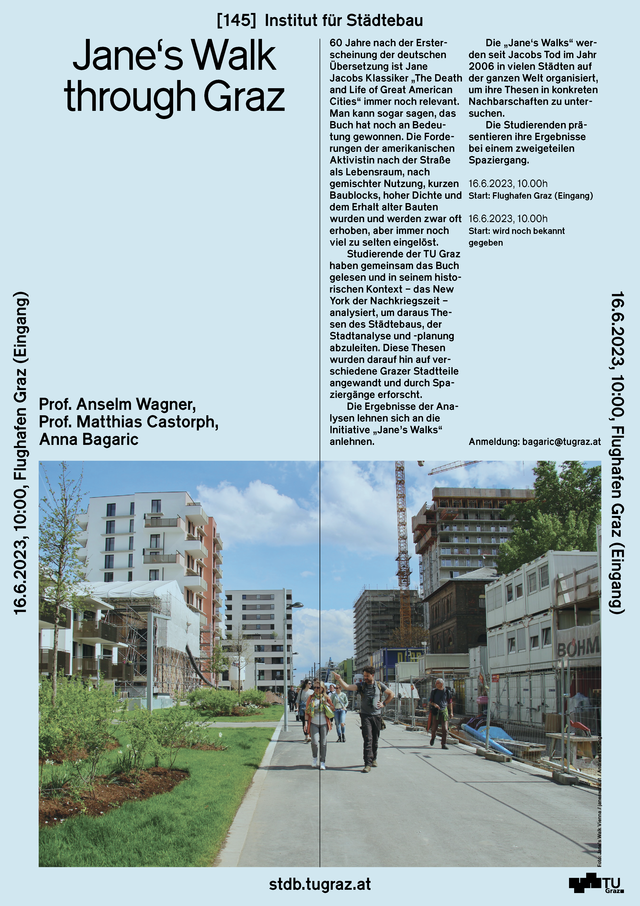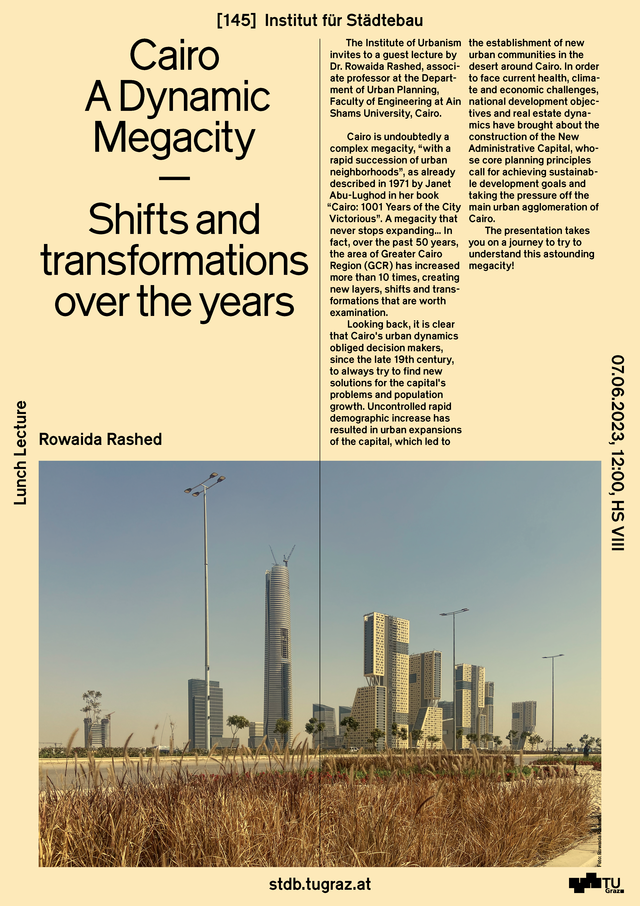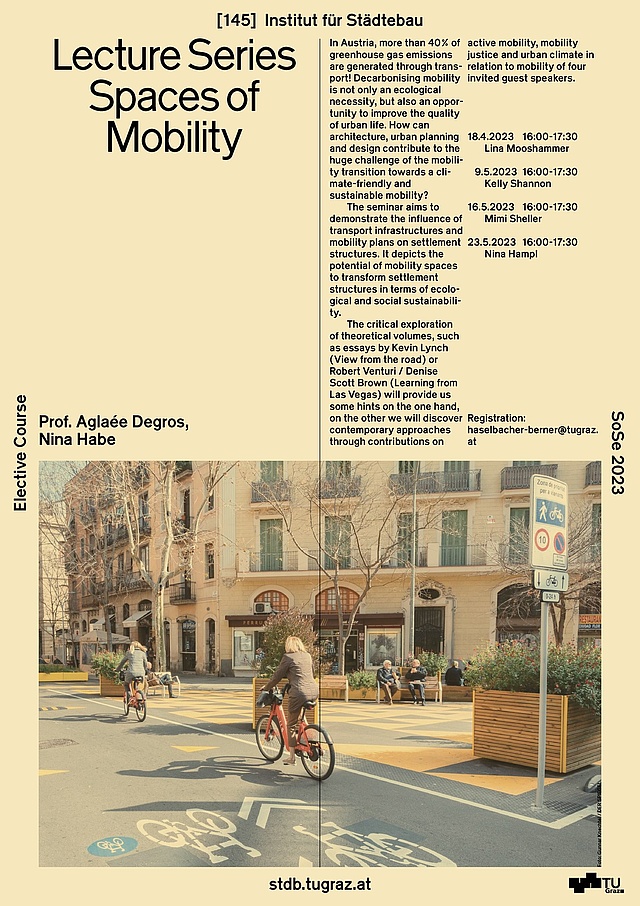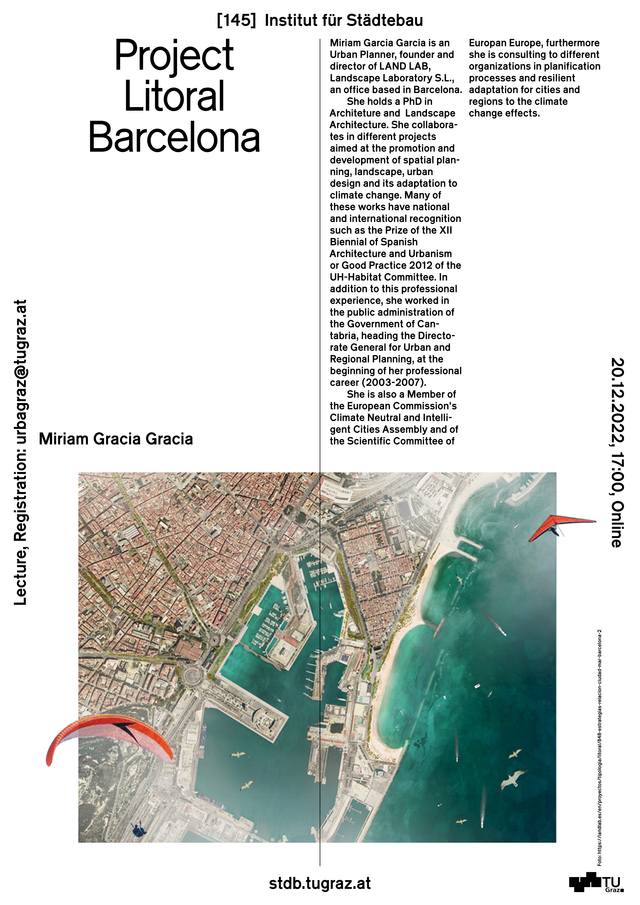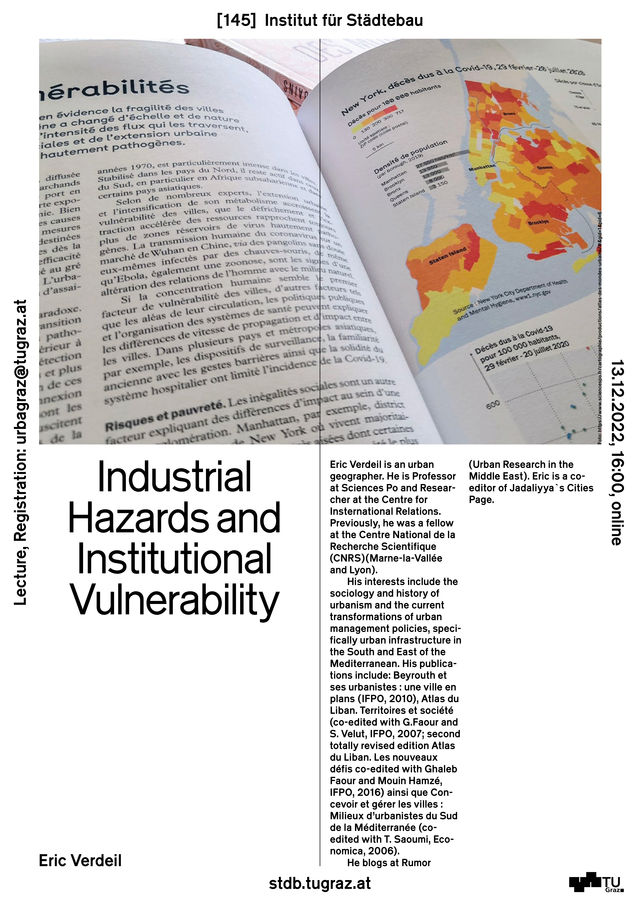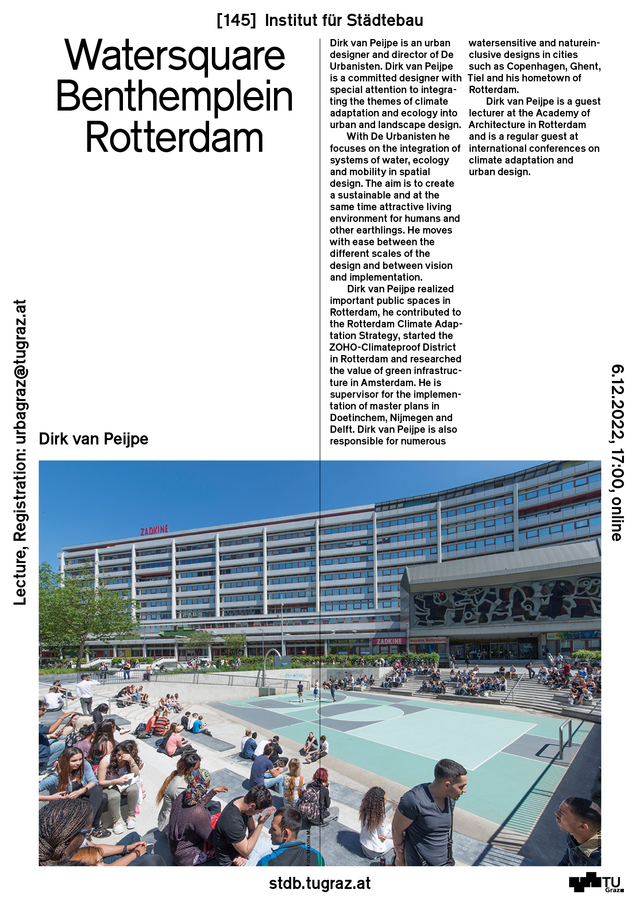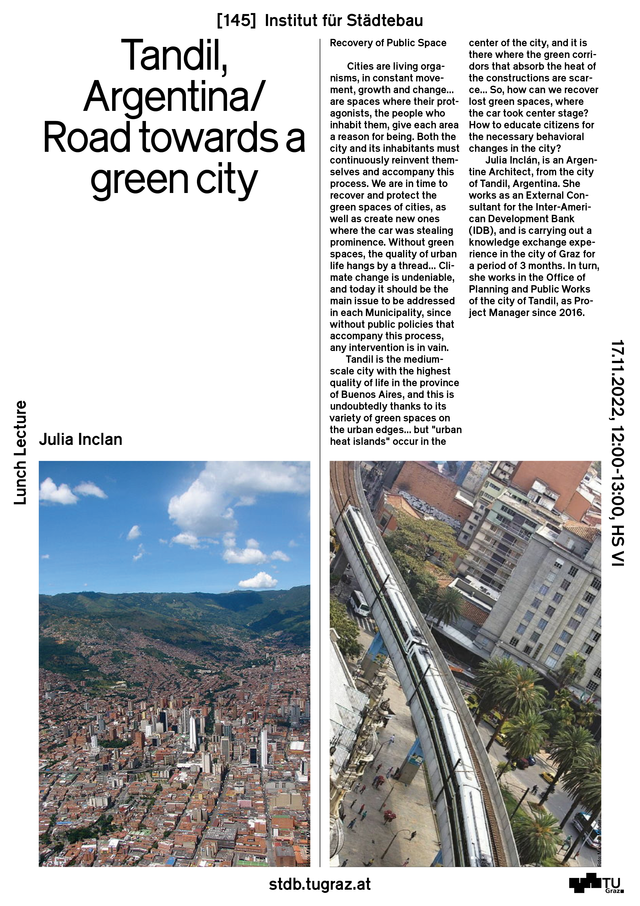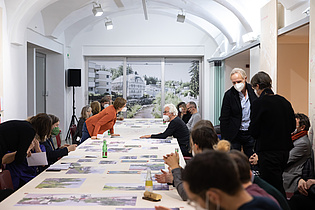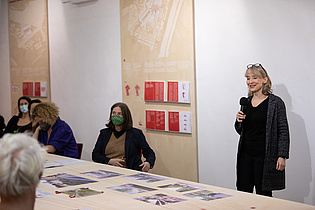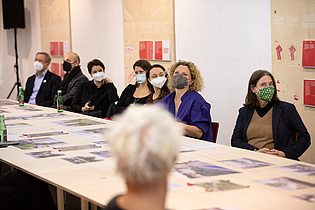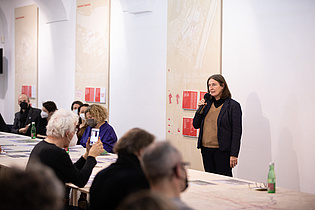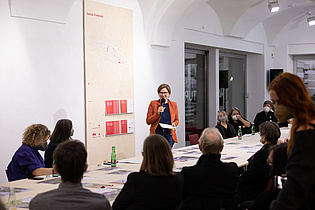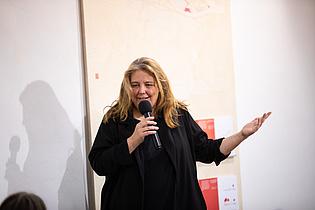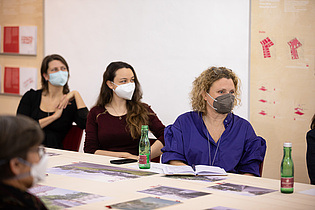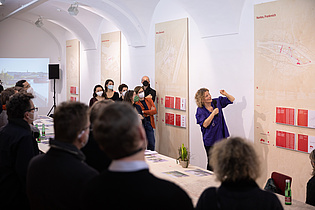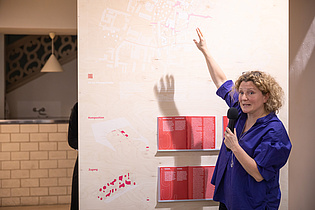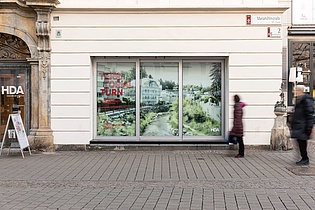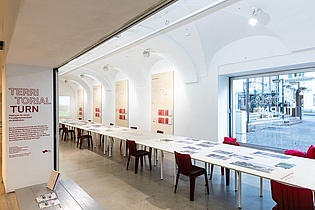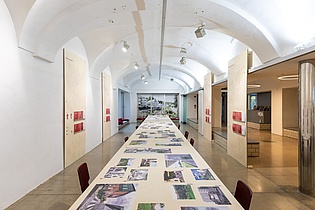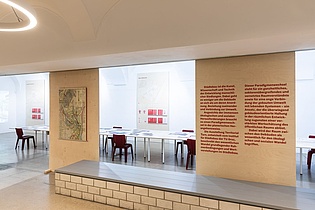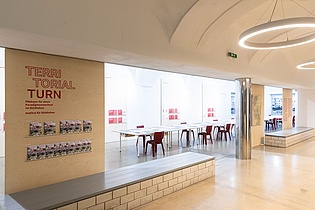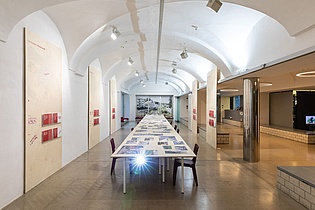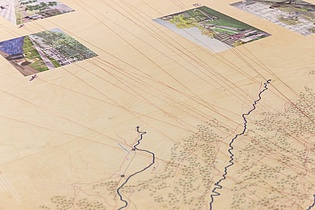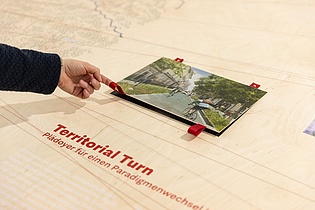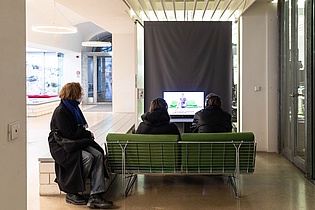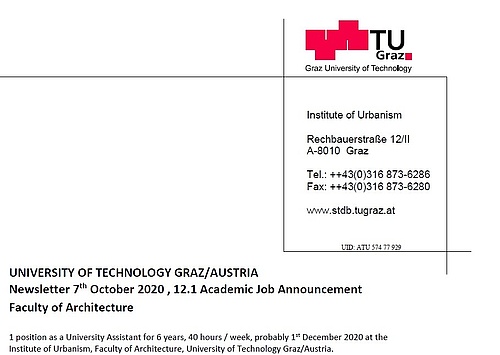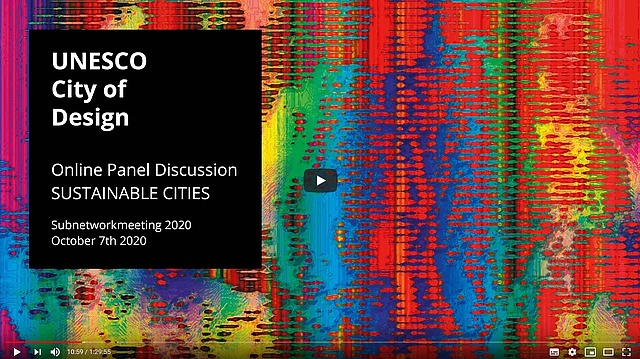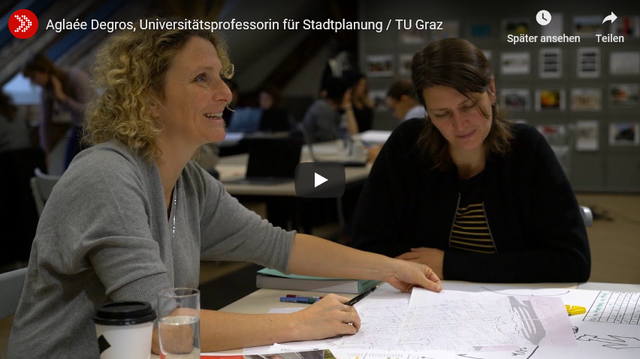Guest Lecture: Wes Degreef
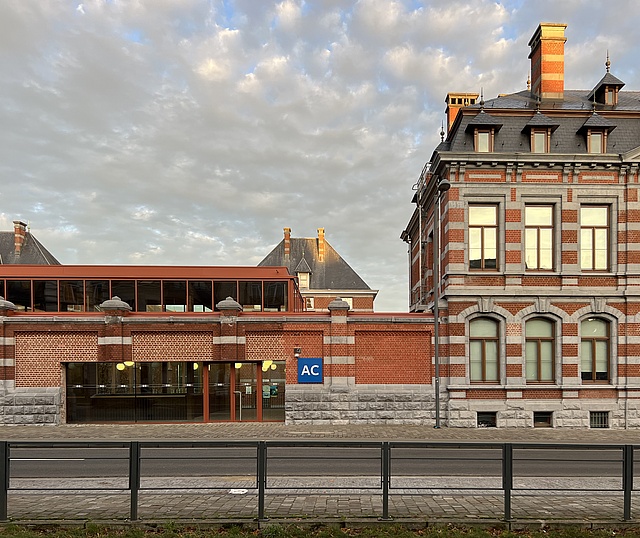
Architecture of Prototyping
Wes Degreef is like a Swiss army knife for the city: designer, builder, lab researcher, and street-corner worker all in one. Through BC architects & studies & materials, he builds, rebuilds, tinkers, and fabricates circular constructions around the world. At the same time, he teaches at KU Leuven Sint-Lucas and works with his team on structural changes in the construction sector, always with future generations in mind.
In his lecture, Wes reflects on the concept of ‘architecture of prototyping’, which originates from projects in Morocco and Ethiopia. There, BC discovered that architecture is most valuable when designers, craftsmen, and users collaborate in an experimental process: designing, building, failing, and learning from each iteration. Back in Europe, the team explored ways to make this approach economically sustainable, expanding their role to include material consulting, construction laboratories, and knowledge exchange within a single project.
This approach challenges the traditional role of architects in Belgium and strives for an integrated approach to the building process. A striking example is Usquare, the circular redevelopment of the former gendarmerie in Ixelles, where reuse, local bio- and geo-materials, and co-production come together. The project becomes a living laboratory for BC’s prototyping philosophy, where learning and experimentation are central.
08.10.2025, 18:00, HSII
Review Day & Sommerausstellung SoSe25
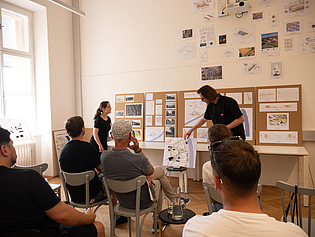
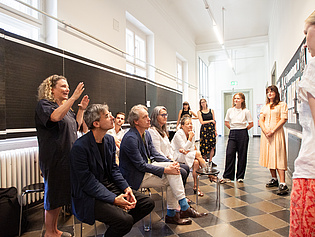
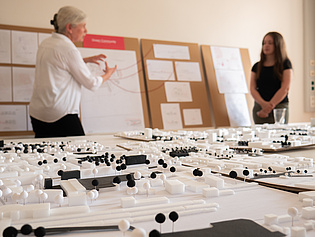
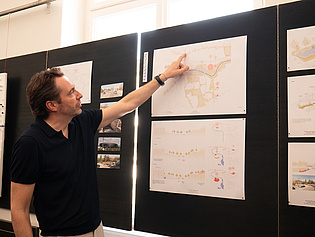
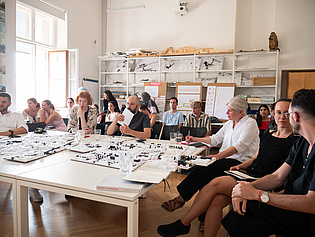
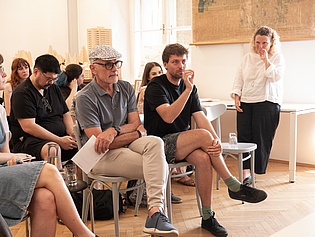
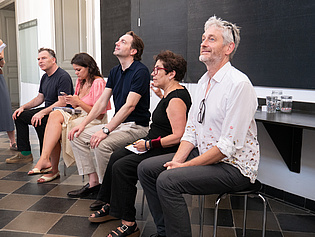
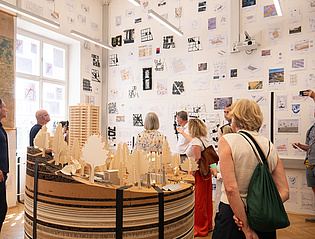
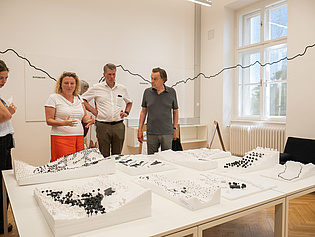
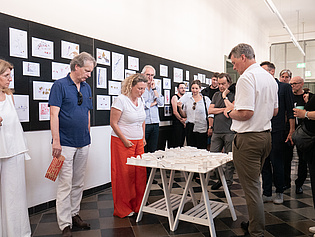
In the last week of June, we concluded the academic year with final presentations by students from Design 2, Design 4, Studio (Master's), and the specialization modules, accompanied by insightful discussions with our international guest critics: Albert Kirchengast, Gertraud Strempfl-Ledl, Caroline Jäger-Klein, Alenka Korenjak, Florian Brand, Julia Wohlfahrt, Victoria Yavorskaya, Michael Koller, Anette Fierro, Hera van Sande, Maarten Van Acker, Matti Drechsel, Sigrid Prinz, Paul Erian, Lore Stangl, Josef-Matthias Printschler, and Gerwin Kortschak.
The week ended with our annual summer exhibition, which showcased projects from across the faculty. A big thank you to all students, colleagues, guests, and our partners from KOEN, AKK, ENSA Versailles, and the Academie van Bouwkunst Amsterdam
ICES 2025
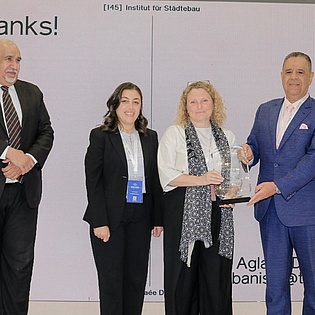
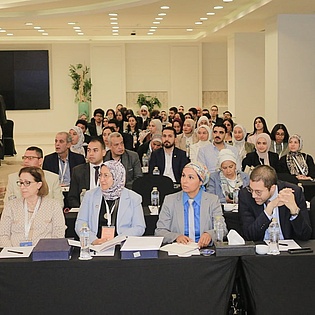
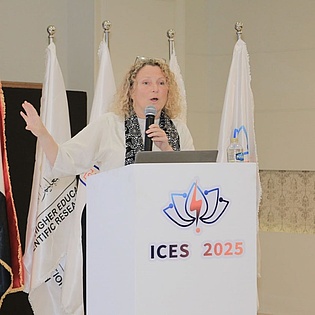
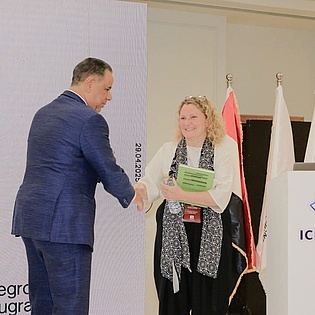
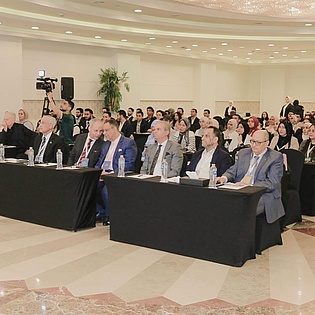
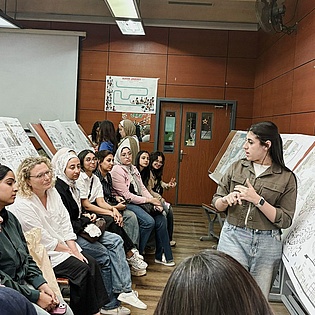
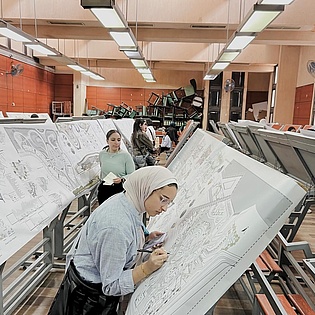
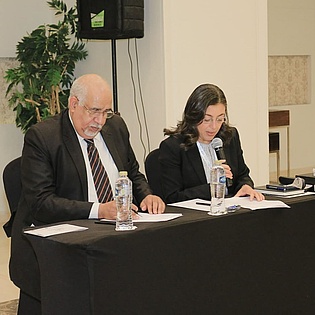
From April 29 to 30, the Faculty of Engineering at Ain Shams University hosted its second international conference. The event focused on the interface between advanced technologies and sustainable practices in the energy sector. It brought together a diverse group of researchers, scientists, and practitioners from around the world to exchange ideas, present innovations, and share experiences.
Prof. Degros was one of the keynote speakers and participated as a guest critic at the Faculty of Architecture at Ain Shams University as part of the studio classes.
The Art of Urban Design
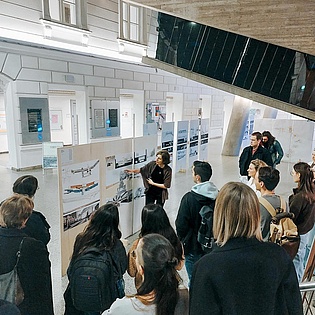
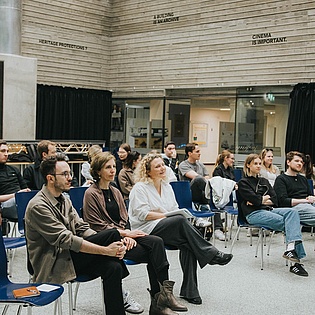
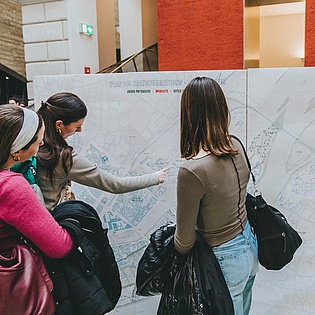
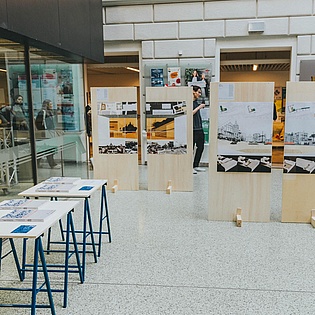
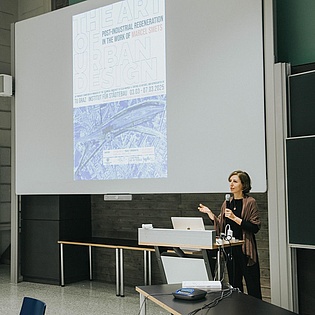
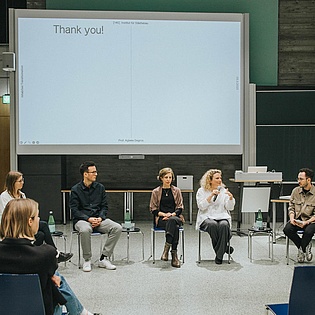
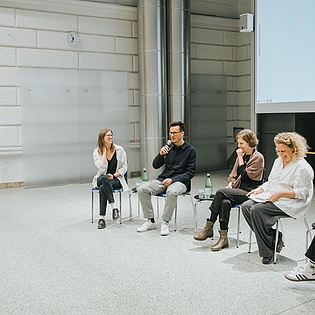
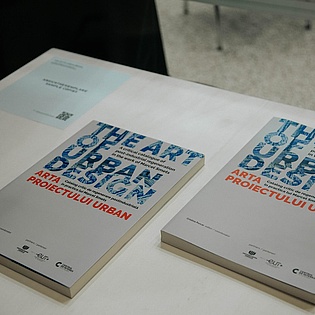
The exhibition “The Art of Urban Design” took place from March 3 to 7, 2025, in the foyer of Graz University of Technology and presented key projects by Marcel Smets, including Leuven Station, Antwerp Central Station, Île de Nantes, and Antwerp's Ring Road, which illustrate the transformation of post-industrial spaces. On March 5, Aglaée Degros and Cristina Purcar (TU Cluj) gave lectures on this topic, followed by a panel discussion with Johannes Bernsteiner and a guided tour of the exhibition. The exhibition highlighted the importance of strategic urban planning for connecting train stations and city centers, an aspect that was also addressed in our design 2, “Bringing Klagenfurt closer to the train station,” making it an ideal start to the semester.
Photos (c) GAM.Lab/TU Graz @tugraz.arch
Review Day WiSe 24/25
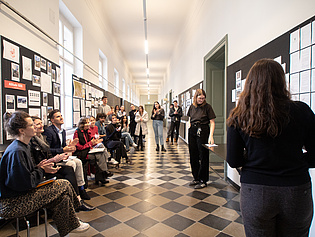
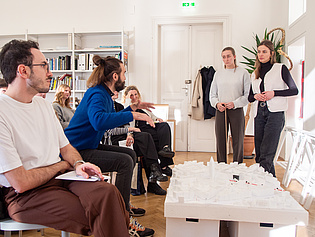
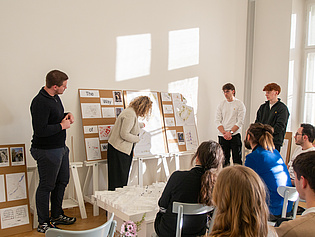
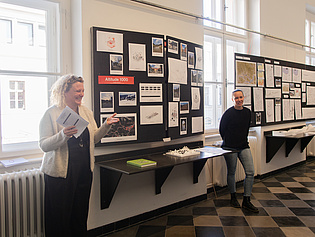
We presented the final works from the past semester to our international guests. The students of Design 1, Design 3, Design (Master) and Specalisation presented their projects on Tuesday, January 28 and Wednesday, January 29. Our guests Andrew Kitching, Alexander Ernst, Lena Schartmüller, Matthias Armengaud, Martina Majcen, Sigrid Bürstmayer, Gerit Kreuzer-Plank, Thomas Untersweg, Theresa Fink, Wolfgang Timmer, Vera Schabbon, Aleksandra Pavicevic and Eva Herunter took part in the discussion and shared their insights. We would like to thank everyone who joined us on these days.
Review Day und Sommerausstellung SoSe 24
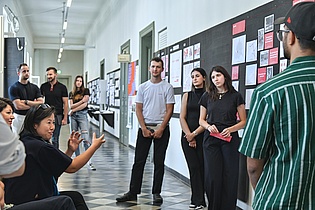
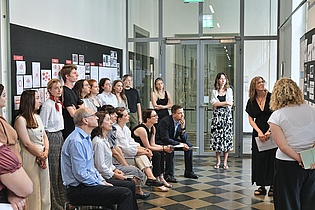
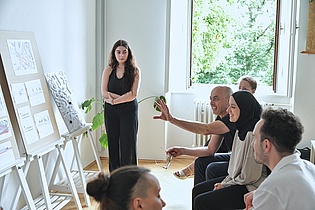
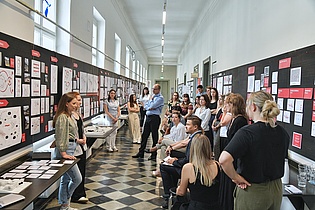
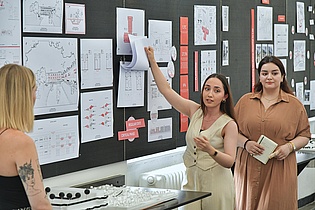
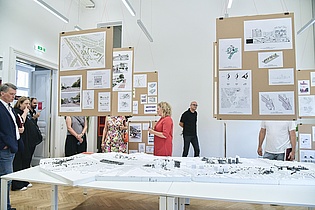
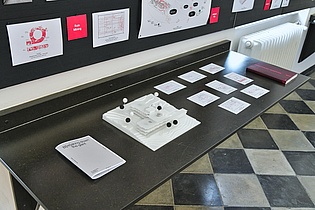
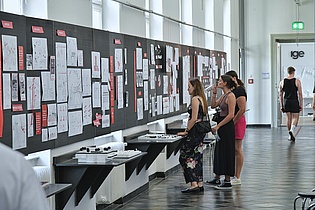
At the end of the summer semester 2024, we concluded the academic year together with our international guests. The students of Design 2, Design 4, Design (Master), and Specialisation presented their projects on Tuesday, June 25, and Wednesday, June 26.
Our guests Ahn Susan, Thomas Kain, Maria Luna Nobile, Anselm Wagner, Caroline Rodlauer, Norbert Quinz, Philipp Quinz, Günter Gangl, Patrizia Di Monte, Gorana Stipeč Brlić, Rose-Anne Gush, Günter Gruber, Cristina Polito, Azra Alibabic, Wolfgang Walder-Weissberg, Ina Maria Schmidbauer, and Iveta Sarmanova took part in the discussion.
We would like to thank everyone who joined us.
On Friday, we celebrated the end of the semester together at the annual summer exhibition, where all of this year’s projects from the Faculty of Architecture were showcased.
Territorial Urbanism Now!
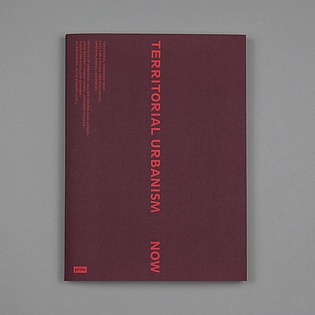
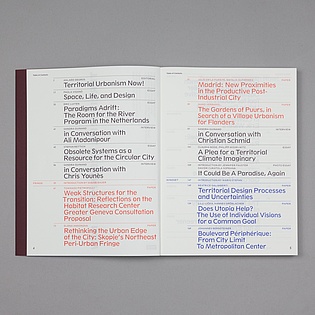
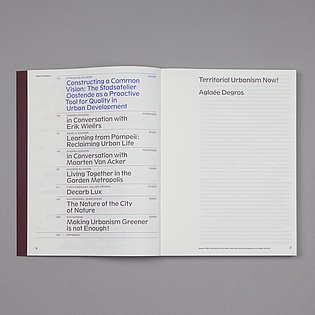
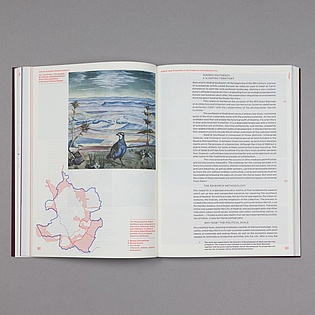
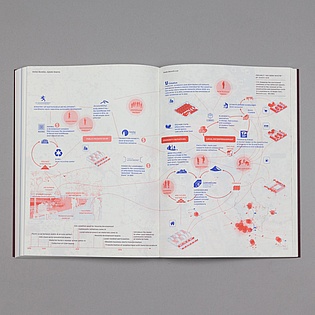
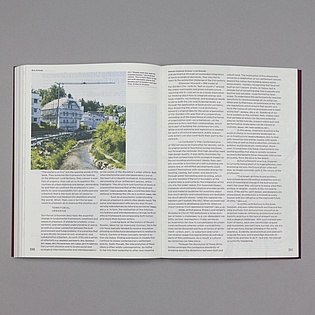
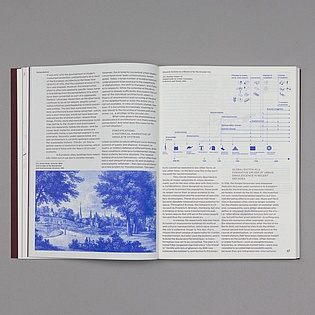
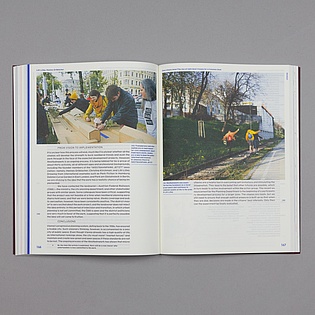
Territorial Urbanism Now!
Calls for a paradigm shift in the conception of urban transformation. It urges us to favor sustainable systems in order to collectively tackle the challenges of climate change. Until now, urban planning and design professionals have integrated green and active mobility systems in the residual spaces available. In the reverse approach envisioned here, these systems become structuring elements of the territory, supported by a much more frugal built environment. The contributions by urbanists, artists, architects, and landscape architects in this publication come from research, practice, and teaching. Paola Viganò, Eric Luiten, Sandra Guinand—in conversation with Ali Madanipour, Chris Younes, Christian Schmid, Eric Wieërs, and Maarten Van Acker—Stefan Rettich, Tommaso Pietropolli, Elena Andonova, Julio de la Fuente, Natalia Gutierrez, Ward Verbakel, Claudia Bode, Philipp Misselwitz, Davide Curatola Soprana, Beatrice Galimberti, Lilli Lička, Hannes Groblacher, Johannes Bernsteiner, Stefan Devoldere, Anselm Wagner, Susanne Eliasson, Eva Pfannes, Jesse Honsa, and Stefan Bendiks not only introduce a much-needed paradigm shift, but also show us the premises for its realization.
The book is available for orders as Softcover or E-Book:
jovis.de/de/book/9783986120641
Photos (c) GAM.LAB, TU Graz
Exhibition "Habitat Graz"
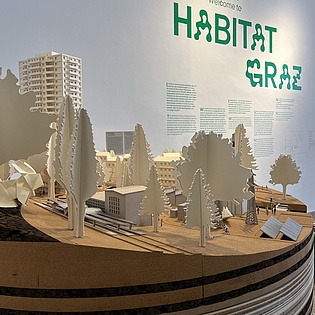
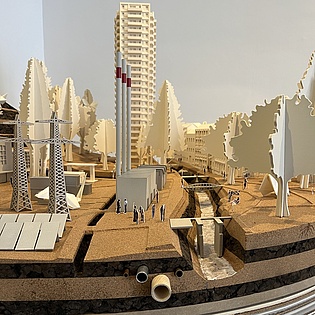
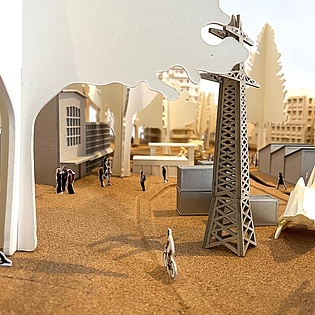
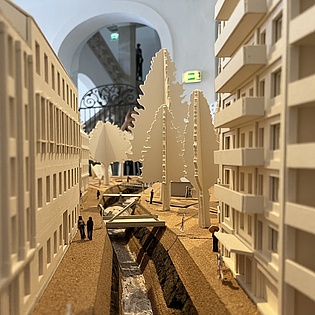
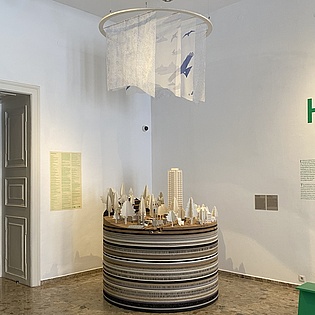
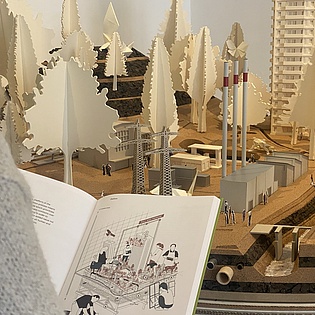
The Inhabited Territory model is a section of the urban area of Graz and goes beyond the mere representation of buildings: it integrates both natural and human systems and aims to rethink urban planning. At its core is an integrated, inhabited model that takes climate change into account and values ecological and social systems – in contrast to speculative planning concepts.
This approach requires alternative planning that emphasizes green and blue continuity, collective processes, and resource efficiency. The city is not understood as a space for consumption or protection, but as an ecologically and socially lived space.
The model was developed in cooperation with the KOEN Institute (Institute for Construction and Design Principles) and students of the elective course Hazard Urbanism.
The model was part of the “Habitat Graz” exhibition at the Graz Museum, which ran from May 16, 2024, to February 2, 2025
Review Day 23/24
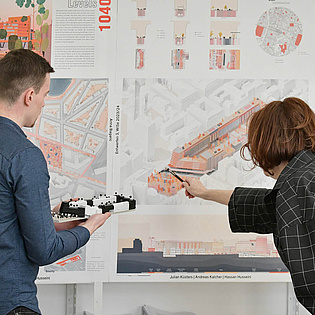
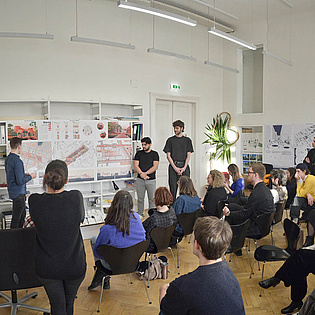
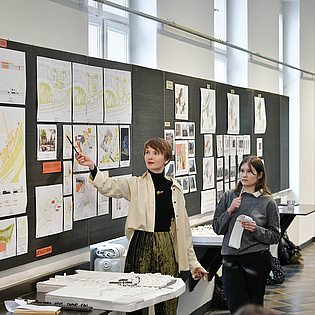
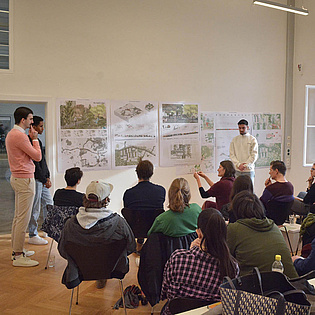
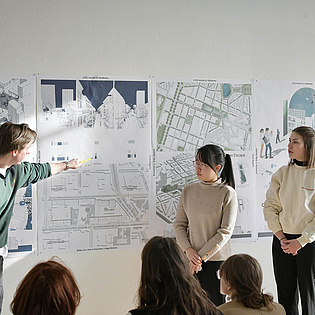
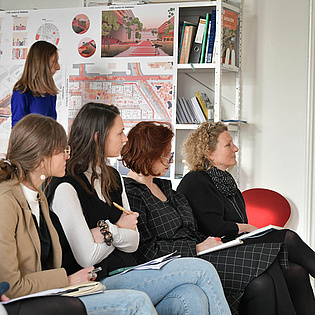
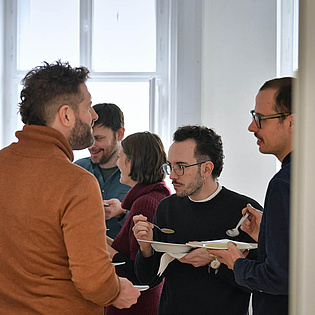
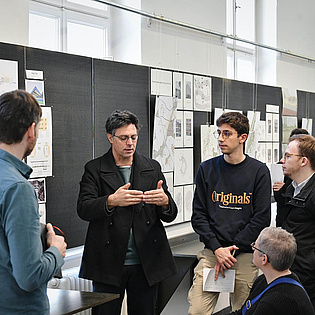
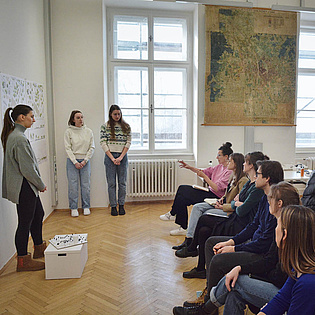
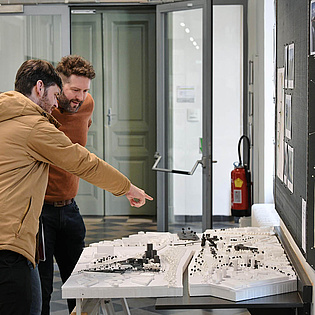
On 31st of January 2024 we had our final presentations of the Design (Master), Design 1 and Design 3 studios. We want to thank all the students that prepared their projects all semester long, and our guests (Julian Brües, Carlotta Bonura, Carlos Favero Marchi, Adam Sebestyen, Tom Leenders, Bert Claes, Goedele Desmets, Andreas Kurths, Ward van Aershot, Michael Deutsch, Lena Schartmüller, Nele Plevoets, Julia Frühlich, Anna-Maria Jäger)who came from all over Europe to join us on this day.
Excursion
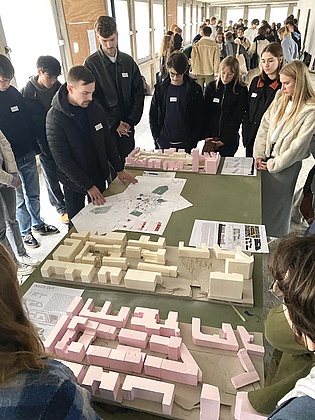
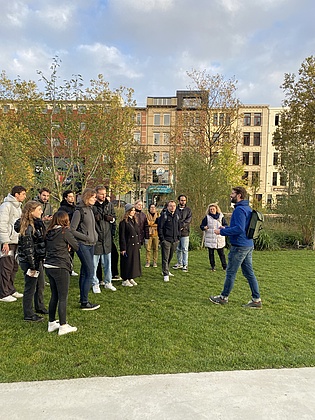
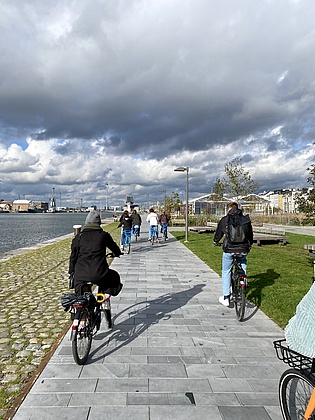
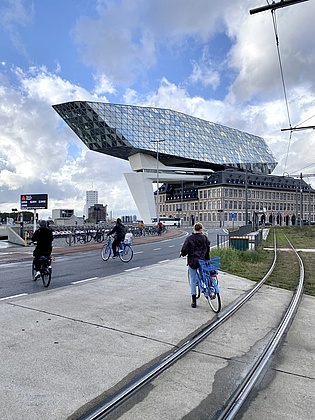
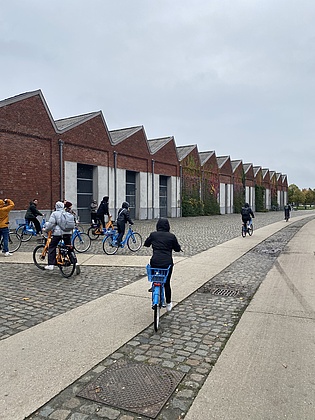
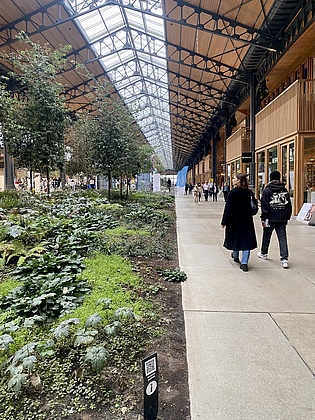
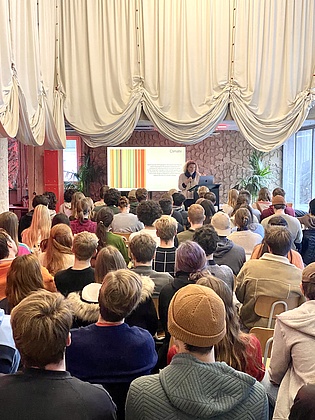
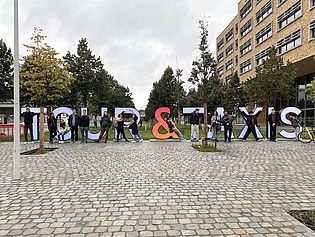
This semester 23/24 we are working on the Ring in Antwerp in Design (Master) and on the European Quarter in Brussels in Design 1 and 3. We were on site together with the students to gain a better understanding of the locations.
Roadshow "Towards Territorial Transition" Luxemburg
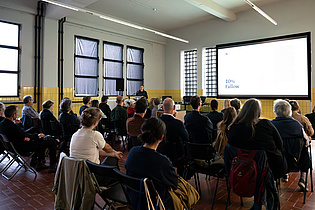
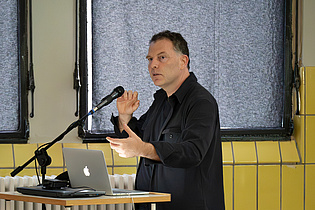
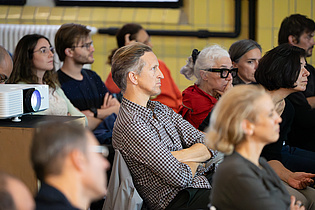
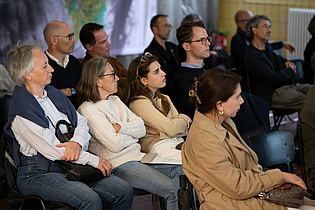
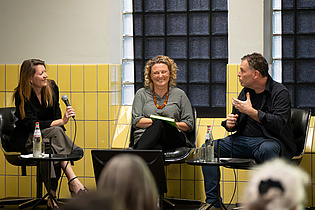
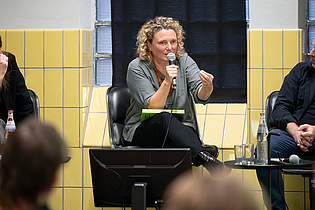
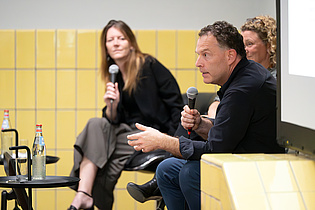
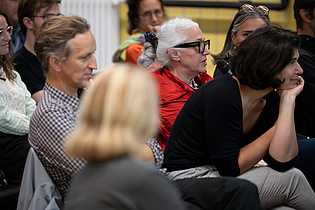
On 3 October 2023, Prof. Aglaée Degros, Matthias Arrmengaud (AWP) and Ingrid Taillander (ITAR Architecturres) presented the new publication “Towards Territorial Transition - A Plea to Large Scale Decarbonizing” at the LUCA - Luxembourg Center for Architecture.
Photos © luca - Luxembourg Center for Architecture
Road Show "Towards Territorial Transition"
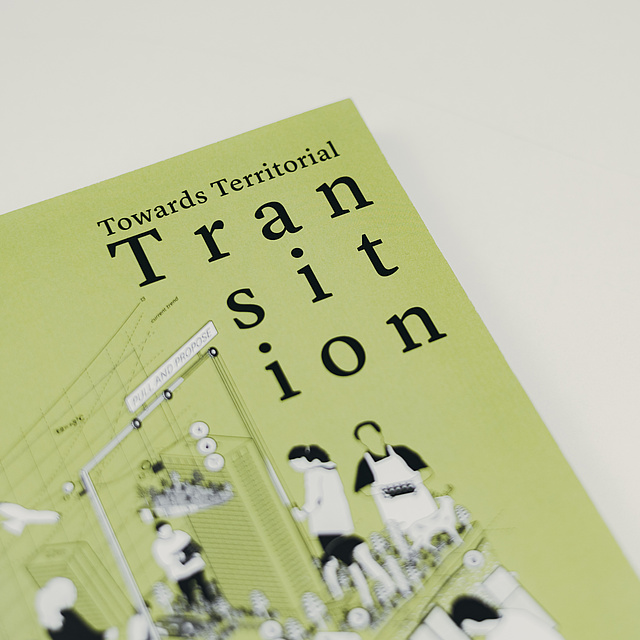
(c) Ingo Candussi
The Institute of Urbanism, TU Graz and the École Nationale Supérieure d'Architecture, Versailles are delighted to announce the upcoming book launch of our latest publication:
“Towards Territorial Transition”
by Matthias Armengaud and Aglaée Degros
with Radostina Radulova-Stahmer
Join us for the book presentation of our newest publication “Towards Territorial Transition” by Matthias Armengaud and Aglaée Degros with Radostina Radulova-Stahmer and let’s elaborate together with international guests, such as Anita Berrizbeitia, Simon Hartmann and many more on climate positive urbanism.
We will celebrate and discuss together through an international road show comprised by following destinations:
16th of September 2023
book presentation Venice Biennale Belgium Pavilion
29th of September 2023
book presentation at the Schlossberg Museum in Graz, Austria
3th of October 2023
book presentation at LUCA Luxembourg, Luxembourg
9th of October 2023
book presentation at the ENSAP Versailles, France
Towards Territorial Transition is a plea to large-scale decarbonizing.
It presents new spatial strategies, concepts, and approaches for shaping large-scale and transnational developments in architecture and urban design towards decarbonizationand ecological transition.
The contributions investigate interactions between ecological and resource-related systems and landscapes. They also explore potential solutions to address and deal with the dramatic threats posed by climate change and the emerging social crisis.
The book introduces six basic notions: territory, scale, transition, resource, platform, and uncertainty. It visualizes them with spatial strategies elaborated at the École Nationale Supérieure d'Architecture Versailles, International master "Invisible metropolis" and at Graz University of Technology, Institute of Urbanism.
An introductory round table discussion with Matthias Armengaud, Anita Berrizbeitia, Aglaée Degros, Panos Mantziaras and Radostina Radulova-Stahmer outlines the ecological transition’s spectrum of meaning, addressing its relevance and necessity as well as discussing its dynamics in terms of tools, measurability and design.
Moreover, the book presents a selection of transnational projects of territorial transition, such as Luxembourg in Transition, Rheinisches Revier, Grand Genève, Top Noordrand, Amiter and Raumbilder Lausitz and Essays from Marc Armengaud, Stefan Bendiks, Matthijs Bouw, Florian Dupont, Simon Hartmann, Radostina Radulova-Stahmer, Eva Schwab and Ingrid Taillandier.
Please click here to register and receive more information for the event in Graz.
Preorder by publisher.
Final Critics and Summer Exhibition
Last week we concluded the academic year together with guests. The students of Design 2, Design 4 and Design (Master) presented their projects on Wednesday, 28.7. and got feedback from Anna Gasco, Juliette Bekkering, Glenn Lyppens, Martin Zettel, Katarzyna Wojciechowska, Dominik Weissenegger, Rowaida Rashed, Eva Schwab, Carina Kurz, Andreas Lichtblau und Petra Petersson. We want to thank everyone for joining us. The following day we celebrated the end of the semester together at the annual Open Architecture Exhibition, where all this year's projects of the Faculty of Architecture were shown.
(c) Ingo Candussi, (c) Katarina Lovric, GAM.Lab
Ringvorlesung Diversität
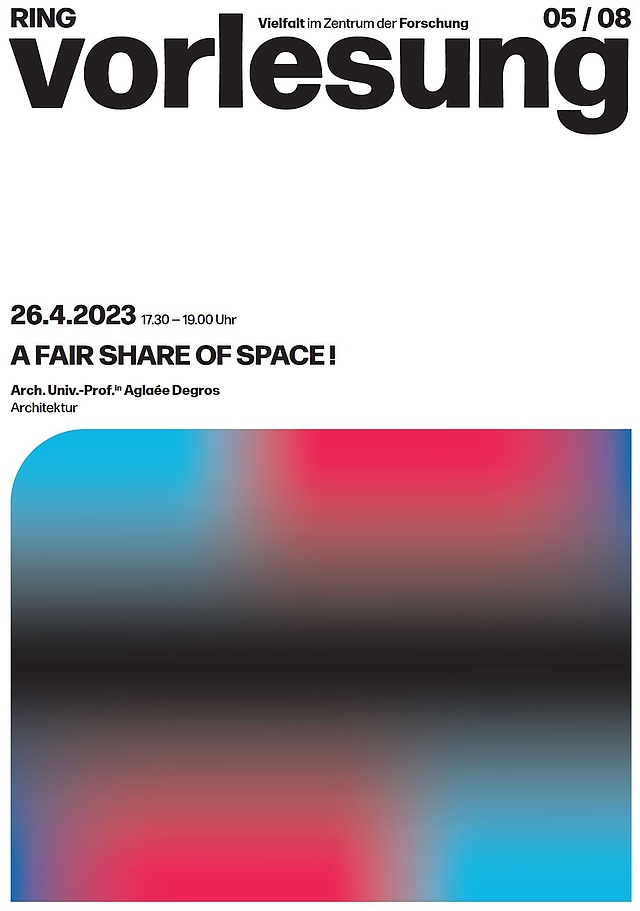
Although sometimes forgotten, traffic spaces are also public spaces. That is, spaces shared by different users. Public space may not be defined as a place to park personal property or a place dominated by a particular type of user. In fact, it is rarely perceived or treated as a space for everyone with a place for ecology and quality of life. The lecture will attempt to show how to transform these spaces through pioneering examples, but will also highlight the pitfalls to be avoided and the role of research in moving towards a more equitable sharing of space.
Venue: Seminarraum BTM 038, Stremayrgasse 16/EG
Registration: ringvorlesung.diversitaet@tugraz.at
New European Bauhaus Lecture
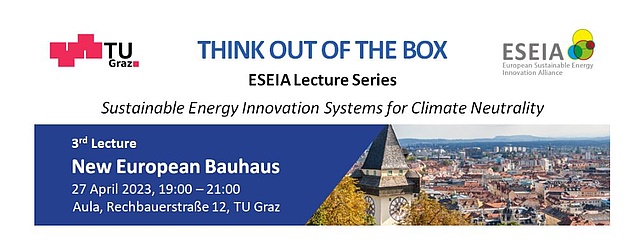
New European Bauhaus for Climate Neutral Cities: Novel ways of engaging with urban and natural heritage.
The 3rd lecture of the NEB series will take place on 27 April 2023 with Prof. Aglaée Degros as responder at 19.00 in the auditorium of TU Graz.
Program: Guest lecture by Gintaras Stauskis , ESEIA Focus Group Leader Smart Buildings, VGTU, Lithuania
Response 1: Aglaee Degros , TU Graz, Head of Institute of Urbanism
Response 2: Thomas Drage , City of Graz, Climate Protection Officer
Exhibition of best practice: Green Divan by Sanela Pansinger, adasca
Chair: Urs Hirschberg , TU Graz, Head of Institute Architecture and Media
Registration: www.cognitoforms.com/Eseia1/registrationeseialectureseries3rdlecture
PhD-Day of the Faculty of Architecture
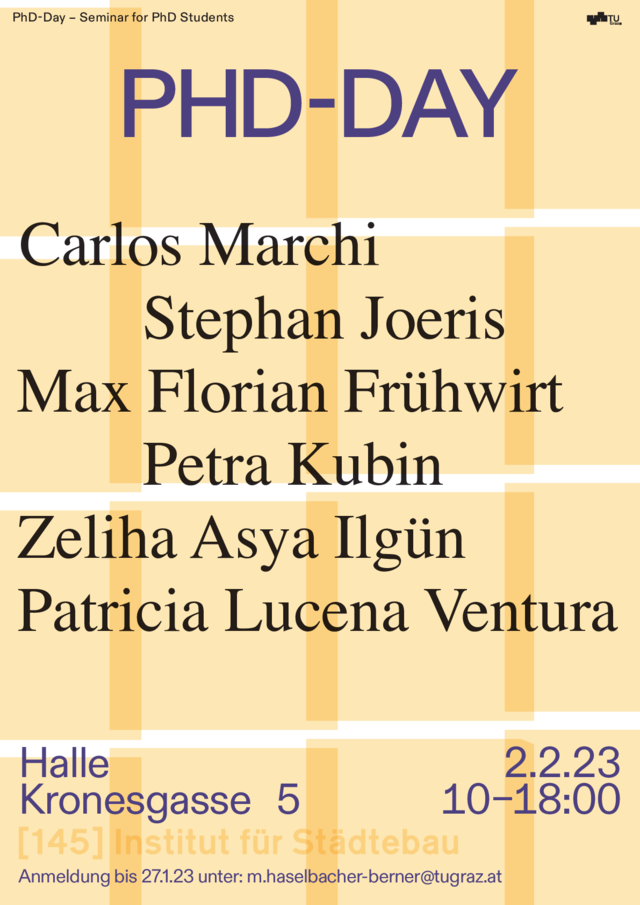
PhD-Day of the Faculty of Architecture.
With topics including: Digitalisation, Ecology and Participation.
February 2nd, 10am - 5pm
Halle, KOEN institute,
Kronesgasse 5, 8010 Graz
Please register with Michaela Haselbacher-Berner: m.haselbacher-berner@tugraz.at
Workshop PeriSponge
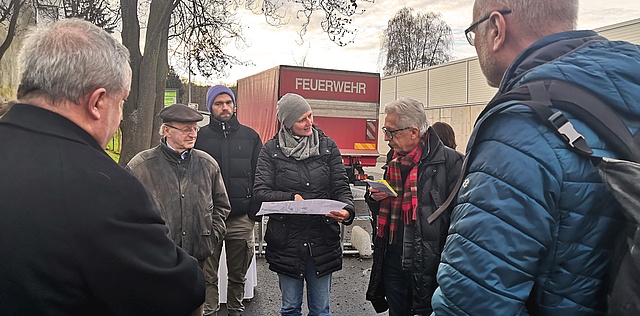
On 12 January 2023, the first participation and planning workshop for the PeriSponge implementation project took place in Feldbach. Eva Schwab from the Institute of Urbanism presented the research project to the citizens and bgmr landscape architects then presented the preliminary design. Mayor Josef Ober, as well as the building department and the project team were available to answer questions from the public and stakeholders.
The project envisages infiltration-capable pavements and tree plantings in car parks, retention areas and amenity areas in adjacent open spaces near the street, and a meeting zone/ residential street. The preliminary design will be revised by bgmr landscape architects in spring 2023, according to feedback from the public.
Residents and interested parties still have the opportunity to make suggestions and proposals until 3 March 2023. The contact person is Maria Baumgartner: m.baum@aon.at.
On 21 June 2023, the revised design will be presented to the citizens in the second planning workshop.
The project is funded by the Climate and Energy Fund and is carried out within the framework of the programme "Lighthouses for Resilient Cities 2040".
Symposium
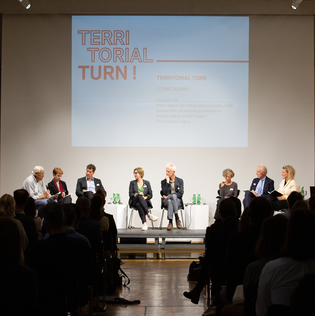
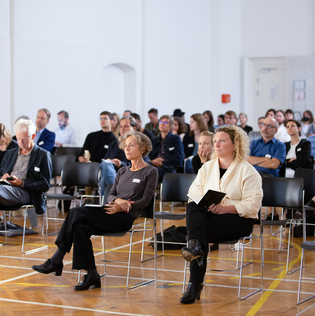
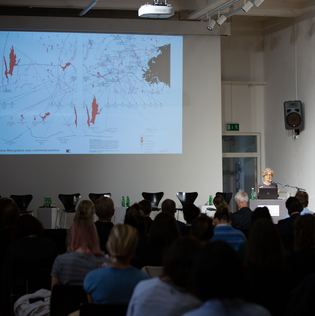
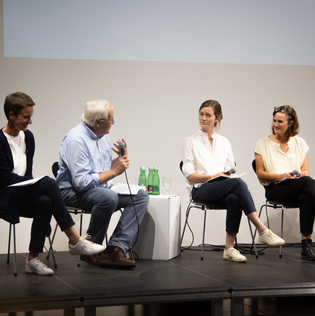
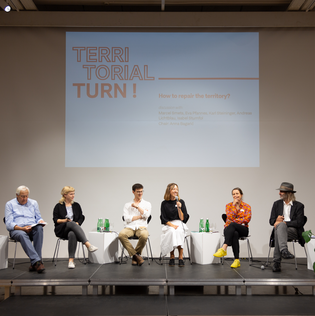
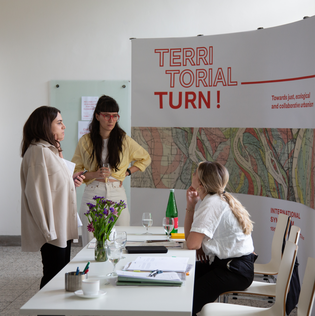
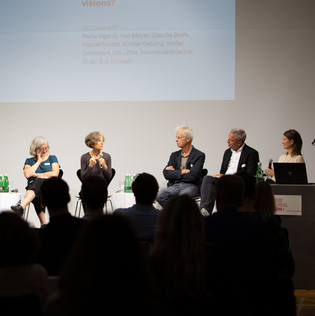
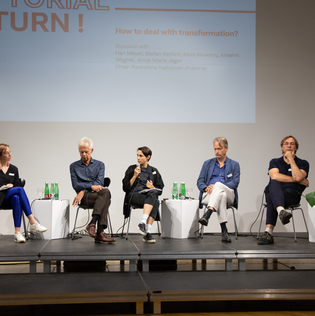
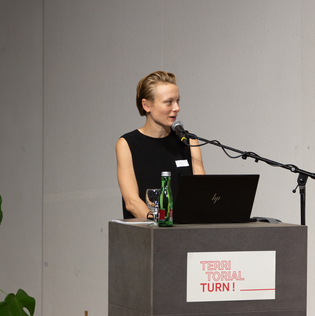
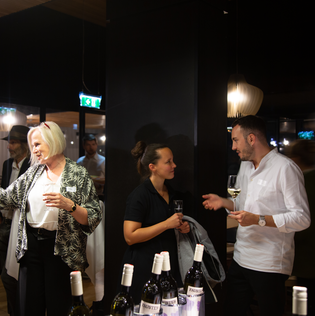
The International Symposium Territorial Turn! was held by the Institute of Urbanism, TU Graz, and elaborated together with our our keynote speakers and presenters on changes, values and framework conditions of urbanism. The discussion on theoretical concepts and ideas, as well as pioneering practical urban design propositions was contributed to actively think, plan, design, and implement an ecological and equitable urban future on a territorial scale.
The symposium Territorial Turn! took place in Graz on the 15th and 16th of September 2022. The symposium, which is part of the New European Bauhaus Program, offerd 1,5 days of presentations and discussions with international scholars and practitioners of the disciplines of Urbanism, Architecture, Landscape, Planning, Urban Studies and Design such as Susanne Eliasson (GRAU), Stefan Rettich (University of Kassel), Eva Pfannes (OOZE), Paola Viganò (EPFL Lausanne), who presented their perspectives on the Territorial Turn. It also featured testimonies of Ali Madanipour (University of New Castle),Christian Schmid (ETHZ), Maarten Van Acker (University of Antwerpen), Erik Wieërs (Flemish Government) and Judith Schwentner (City of Graz).
In addition, paper presentations were followed by discussion panelled with Han Meyer (TU Delft ) and Marcel Smets (KU Leuven), among others.
Exhibition What about transitional architecture & urbanism?
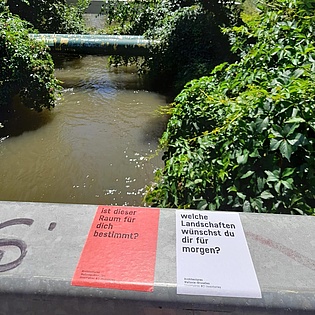
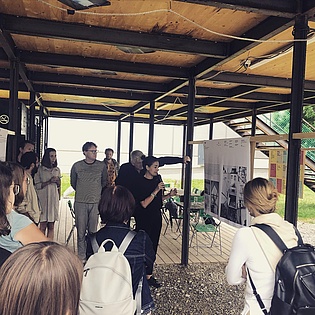
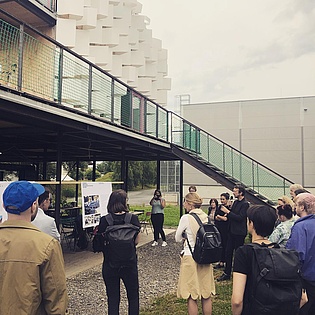
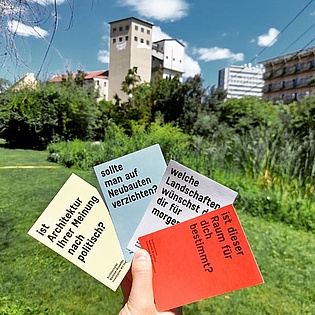
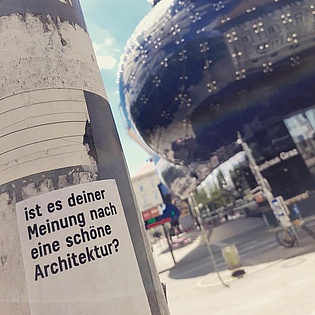
At the invitation of the Institute of Urbanism at Graz University of Technology, the project architectures ! inventaire collectif by Wallonie-Bruxelles Architectures (WBA) will be presented in Graz.
What about transitional architecture & urbanism? is the title and the theme that will be on display at Club Hybrid in the form of an exhibition and book presentation.
What about transitional architecture & urbanism? is based on the book Inventories #3, which examines 45 exemplary buildings selected for the first time by the public sector and comprising individual and group housing, workspaces, social facilities and public spaces. Eight of these buildings are on display in the exhibition at Club Hybrid. In addition, 45 measures to improve life in urban and rural areas are presented. They are set in the context of current issues and illustrate the work of those concerned with the involvement of professionals and users, the environment, the economy of means and social housing.
architectures ! inventaire collectif
Duration of the exhibition: Thu, 7 to Sat, 16 July 2022
Curator(s): Pauline de La Boulaye and Gilles Debrun
Venue: Club Hybrid, Herrgottwiesgasse 161, 8055 Graz
Exhibition Talk
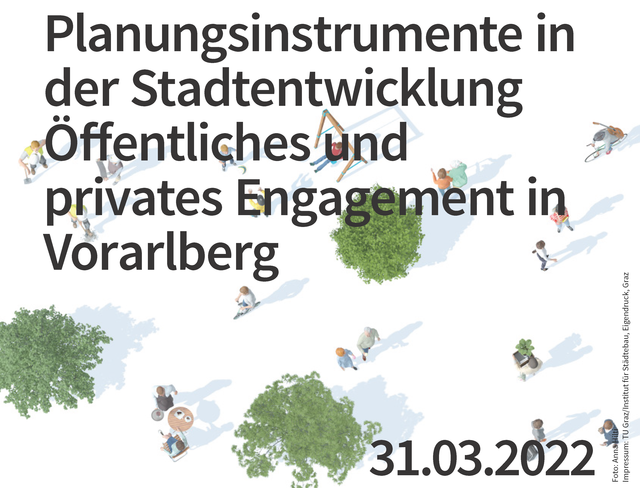
Andrea Krupski von Mansberg
Since May 2021, Andrea Krupski von Mansberg has headed the newly established Department for Urban Development and Mobility in Bregenz. The tasks of the new department include urban planning, townscape and building applications for individual building projects, as well as mobility, traffic planning, environment and climate protection, and geoinformation. In the HDA, she will report on the reorientation of urban planning in Bregenz and the intensive work on the new urban development project "Bregenz Mitte".
Anna Hilti
Anna Hilti will give insights into the project for the development of the "Viertel von Feldkirch". With the so-called "planning dialog", a separate interdisciplinary procedure was developed for this purpose. Together with the planning teams, the building authority and the advisory board of the city of Feldkirch, a master plan was developed for the quarter to be developed. Particular emphasis was also placed here on the outdoor spaces, which are to offer designed green spaces with a quality of stay for the residents of the new quarter.
Location: HDA, Graz
Time: 19.00 - 20.30 o'clock
Registration: www.hda-graz.at
further information:
www.facebook.com/stdb.tugraz.at
https://hda-graz.at/programm/planungsinstrumente-in-der-stadtentwicklung
Exhibition Talk
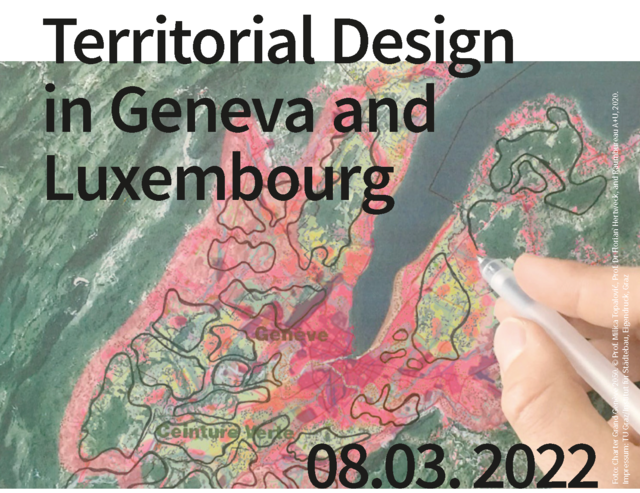
Innovative pathways to decarbonization and resilience
Since the agricultural revolution, the urban realm was seen in the worst case as the antithesis, and in the best case as the complement of its „natural“ environment. The urgency for decarbonization and resilience of our lifestyles sets unprecedented questions and demands radical strategies that unsettle the design disciplines’s legitimacy. Organized and certified by Braillard Foundation‘s Eco-Century Project, the Greater Geneva and the Luxembourg in Transition international consultations cast some light in the global endeavor to reinvent the tools (metrics, forms and narratives) for a new stewardship of the planet.
As the Head of the Office for Architectural, Urban and Landscape Research at the French Ministry of Culture and Communication, Panos Mantziaras initiated research programs on architecture and urbanism in the prism of the ecological transition. As the Director of the Geneva-based Braillard Architectural Foundation, he launched the research and cultural program The Eco-Century Project®, which certified the international consultations for the Greater Geneva and the cross-border region of Luxembourg.
Location: HDA, Graz
Time: 07.00 - 08.30pm
Registration: www.hda-graz.at
further information:
www.facebook.com/stdb.tugraz.at
www.hda-graz.at/programm/territorial-design-in-geneva-and-luxembourg
Territorial Turn
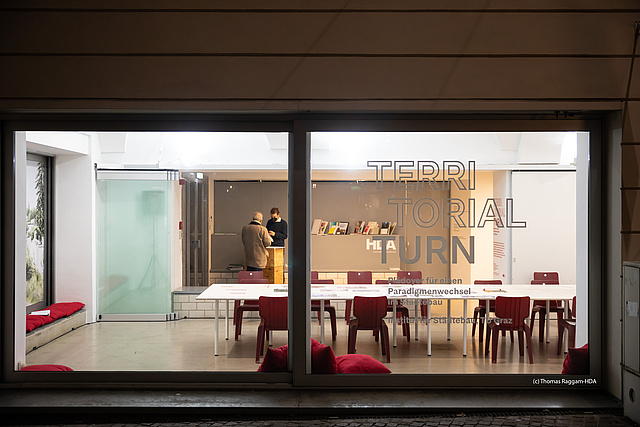
(c) Thomas Raggam-HDA
On Wednesday, 02.02.2022 the exhibition opening TERRITORIAL TURN took place in HDA from 11.00-17.00.
The team of the Institute of Urbanism was present and guided through the exhibition.
The exhibition TERRITORIAL TURN describes the essential change of basic conditions and values in urbanism in favour of an increased appreciation of public space. Bold concepts and pioneering solutions are presented on the basis of seven selected practical examples in Nantes, Leipzig, Amsterdam, Leuven, Vienna, Péronnes-lez-Antoing and Trofaiach. The contents of the exhibition are based on the publication "Basics of Urbanism - 12 notions of territorial transformation" by the Institute of Urbanism, Graz University of Technology, published by Park Books.
Duration of exhibition: 03.02.–03.04.2022
Opening hours: Tue-Sun 10am-6pm
Book Release
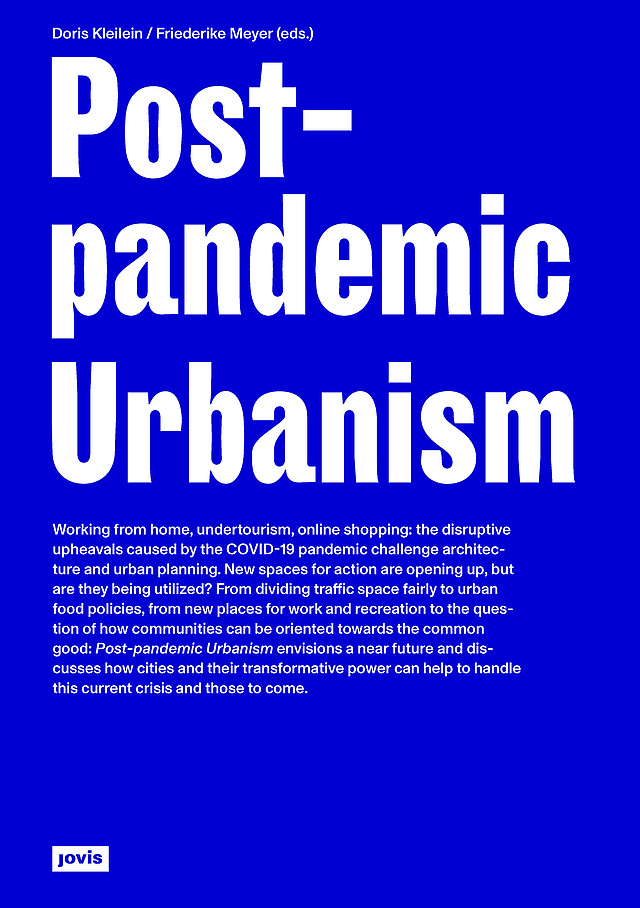
Post-pandemic Urbanism by Jovis, Berlin 2021
Nowhere was the quality of life in cities during the pandemic more evident than in public spaces. Aglaée Degros, who advised the city of Brussels on new mobility concepts and social participation after the outbreak of the pandemic, argues for the upgrading of the immediate living environment; together with Sabine Bauer and Markus Monsberger she identifies traffic space as the area that needs to be redistributed (including on the outskirts of the city).
With contribution of Prof. Aglaée Degros, Sabine Bauer und Markus Monsberger.
Guest Lecture
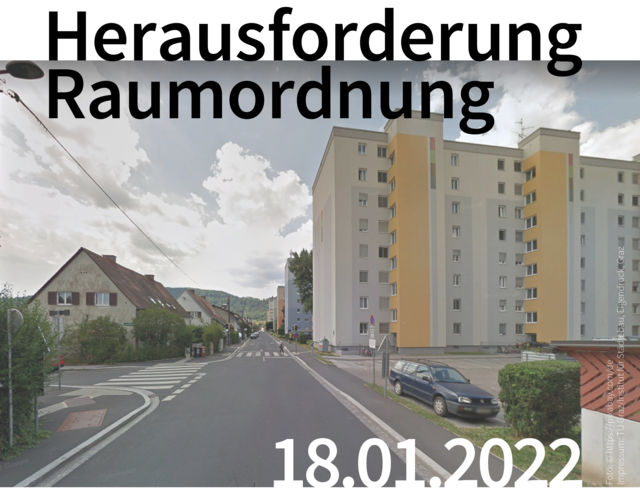
Current challenges for spatial planning in Styria
Local spatial planning with its planning instruments is one of the most important tasks of the municipalities and is carried out by them in their own sphere of action.
However, the municipalities are bound by the legal and other supra-local requirements, whereby the province of Styria advises and accompanies the municipalities, but also reviews the planning of the municipalities for their legality. This can certainly take place in the area of tension between the settlement policy interests of the municipalities, socio-political, environmental and climate-relevant challenges as well as the legal framework conditions.
In the lecture, it will be explained in particular which topics the state but also the municipalities are currently confronted with in the area of spatial planning: Climate protection and expansion of renewable energies, energy spatial planning, natural hazard management, soil protection and containment of land consumption, mobilisation of building land.
Andrea Teschinegg is a lawyer and heads the Department of Building and Spatial Planning in the Environment and Spatial Planning Division of the Office of the Provincial Government of Styria.
Location: Webex (virtuel room)
Time: 5.00 - 7.00 p.m.
Registration: m.haselbacher-berner@tugraz.at
further information:
www.facebook.com/stdb.tugraz.at
Book Release
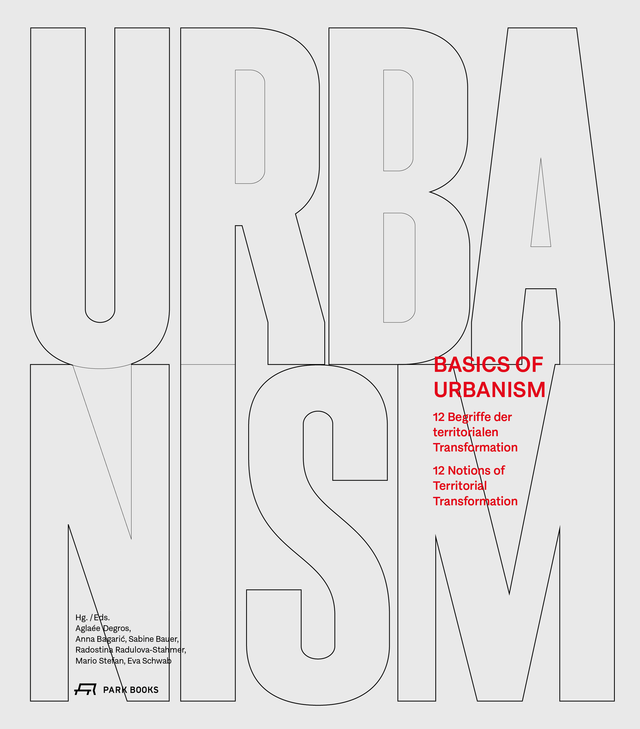
Basics of Urbanism
Aglaée Degros, Anna Bagarić, Sabine Bauer, Radostina Radulova-Stahmer, Mario Stefan, Eva Schwab
Zürich: Park Books, September 2021
Deutsch/Englisch, 244 Seiten, broschiert
ISBN 978-3-03860-260-6
EUR 38,00
Order by publisher
Urban design today is facing a multitude of challenges. Using twelve key terms, this book connects these challenges to projects in this field. It introduces concepts. presents possible solutions, and describes implementation processes. A special focus is put on the interaction of the built environment with living systems—an approach that is slowly gaining acceptance within the urban design community and that is setting aside a primarily building-oriented practice in favor of an increased appreciation of public space.
Basics of Urbanism defines and illustrates parameters with a clearly territorial approach to urban design. Space between buildings is treated as an essential structure for environmental and social change within small-scale neighborhoods and blocks, as well as at the level districts and even entire cities. This approach includes forward-thinking temporal aspects as well as the implementation of existing resources in the creation of new spatial qualities.
With contributions by Markus Bogensberger, Aglaée Degros, Eva Schwab, Marcel Smets. Interviews with Blaz Babnik, Stefan Bendiks, Ilka Cerpes, Harald Gries, Gernot Kupfer, Robert Loher, Claudia Nutz, Ans Persoons, Katarina Psegionnaki, Michael Ryckewaert, Rudolf Scheuvens, Carol Schmitt, Marcel Smets, Maarten van Aacker, Bernd Vlay, Johann Zancanella, and Sibylla Zech.
Online Symposium “Where City and Territory Meet…“
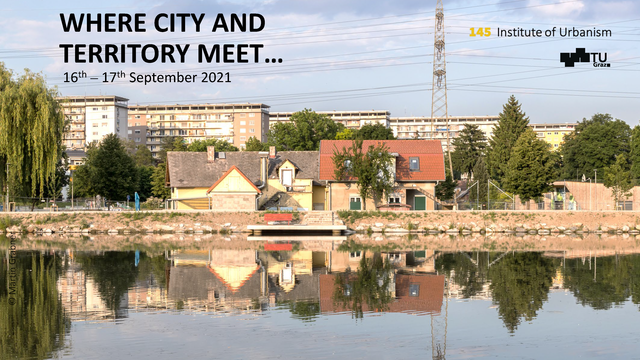
“The city is not a machine, it is an organism.” Han Meyer
In the online symposium "Where City and Territory Meet...", the Institute of Urbanism and its guests discussed the urgent need and the possibilities for repositioning the discipline. The focus is on the goal of achieving high spatial quality and spatial justice in urbanism with the help of pluridisciplinary and pluridimensional implementation processes.
The one and a half days of the symposium (16th and 17th September 2021) were filled with keynotes by Prof. Aglaée Degros, Prof. Emeritus Marcel Smets, Dr. Eva Schwab and DI Markus Bogensberger, paper sessions with panel discussions, video presentations and a closing plenary with all keynote speakers and the guest of honor Prof. Emeritus Han Meyer.
Guest Lecture
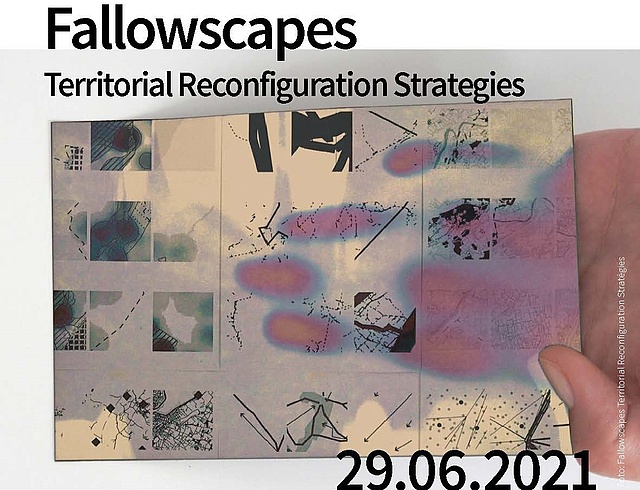
The recognition of the existing in all its dimensions, including the void, the neutralized or the conflicting, the time, the flows, or the out of field. Metabolizing the invisible aims to install a dialectic between Hard and Soft to open new perspectives. Through the tension between sensitive experiences and data; the critical navigation between scales to identify possible articulations; or the temporalization of situations and uses, notably through experimentation and collaborative processes to ease contradictions... Urban metabolism allows us to question the ecological transition (energy, resources, pollution...), with regard to the hypothesis of the fundamental role of technical meshes in the dimensioning of the future urban fabric.
In order to overcome the blocking effects of the planning modes inherited from the twentieth century, we explore strategies of „post-zoning“ compatibilities. To seek compatibilities between registers of the city that were separated in the name of functionalism, and that today end up considerably reducing the friction between functions. It seems to us that it is precisely here that we can and must reappear situations of presence, of mixity, in short, of public project, even if it is only temporarily.
Location: HS VIII & Webex (virtuel room)
Time: 9 Uhr
Registration: urbagraz@tugraz.at
further information:
www.facebook.com/stdb.tugraz.at
Exhibition
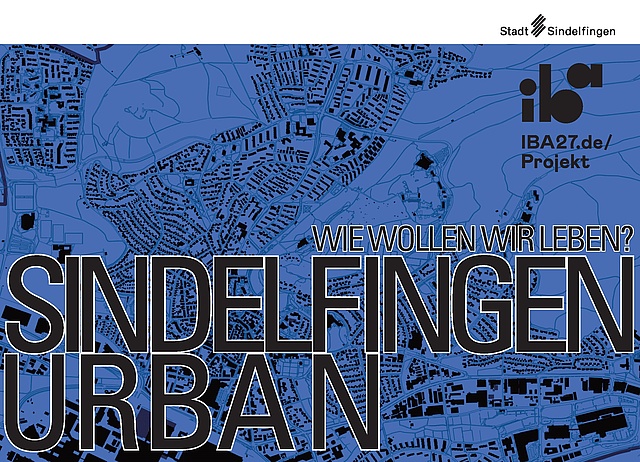
Trying things out, leaving routine behind, thinking outside the box and participating - under this productive motto, the city of Sindelfingen is participating in the International Building Exhibition StadtRegion Stuttgart 2027 with two projects at once. Students from the Graz University of Technology (Faculty of Architecture) with a focus on contextualisation and use of resources have been thinking about the conversion of the hospital in the winter semester 2020/2021.
Their ideas for this major urban development project are on display in the City Hall foyer under the title "Transforming City Regions". On display are the concepts developed by the team, designs in thematic blocks, spatial visualisations and 3-D video models as well as the course of the project.
The project was accompanied by Professor Aglaée Degros, Institute of Urbanism, and Professor Tom Kaden, Institute of Architectural Technology - Chair of Architecture and Timber Construction, Graz University of Technology.
Location: City Hall Foyer, Sindelfingen
Time: 05 - 25 July 2021
Call for Proposal
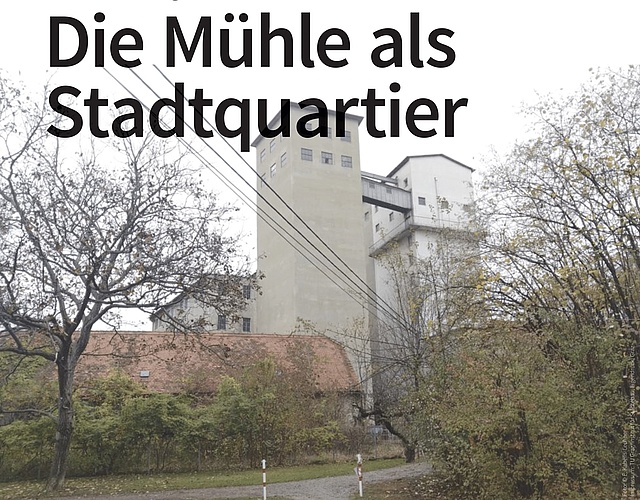
The Rösselmühle existed in Graz for 750 years and only closed its doors in 2014. Starting with the mill of the bakery "Zum weißen Rößl" in the 18th century, the ensemble was rebuilt several times and extended many times. For decades now, the buildings have shaped the surroundings around Griesplatz. Between the Oeversee and Rösselmühl parks, the geriatric health centre and the post office garage, there remains an open space for a place of encounter and culture in the middle of a residential district. The mill as a reminiscence of a producing economy...
Against this background, the master's thesis aims to find new functions for the ensemble and to conceive a vital and diverse place for the neighbourhood.
The goal is a development plan for a reinterpretation of the buildings with functions that find a place in an industrial monument that characterises the location. The question between preservation and new construction as well as housing and supplementary, also public functions must be answered and a design for revitalisation along the Mühlgang must be planned.
Application deadline:
30.June 2021
Documents as PDF by mail to urbagraz@tugraz.at
Lunch Lecture
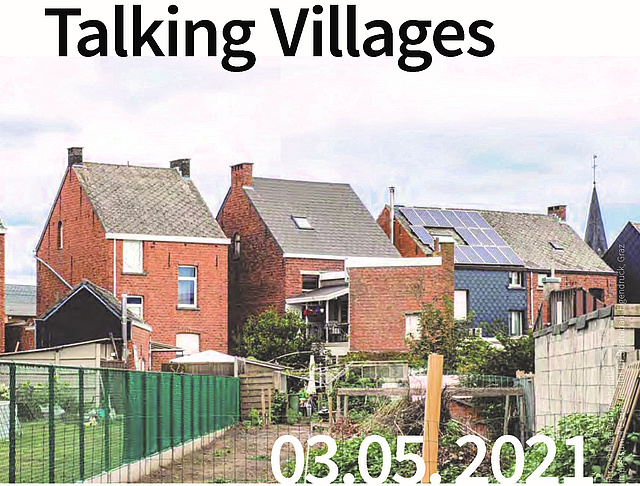
Is there such a thing as ‘village architecture’, and if so, can we grasp what makes it qualitative? By using the metaphor of architecture as a language, we assume that ‘village architecture’ can be seen as a distinct dialect or even language branch within the broader architectural field. Understanding its’ specific language characteristics and vocabulary allows us to experiment and recombine such architecture as designers working in village contexts. If we accept architecture as the smallest gesture of urban design, we can even start to address challenges such as climate change or mobility transitions from at architectural scale, a scale well suited for villages.
While the transformation of villages is speeding up in Flanders due to population growth, too often the quality of the produced architecture is problematic. In this lecture we look closer at a potential vocabulary of village figures and tactics that contemporary architecture can use to operate within densifying villages.
Ward Verbakel, partner at plusoffice architects and adj. professor at KU Leuven is conducting a PhD research on the urbanism of villages in Flanders.
Location: Webex (virtual room)
Time: 12 o'clock
Registration: urbagraz@tugraz.at
further information:
www.facebook.com/stdb.tugraz.at
Webinar University Course
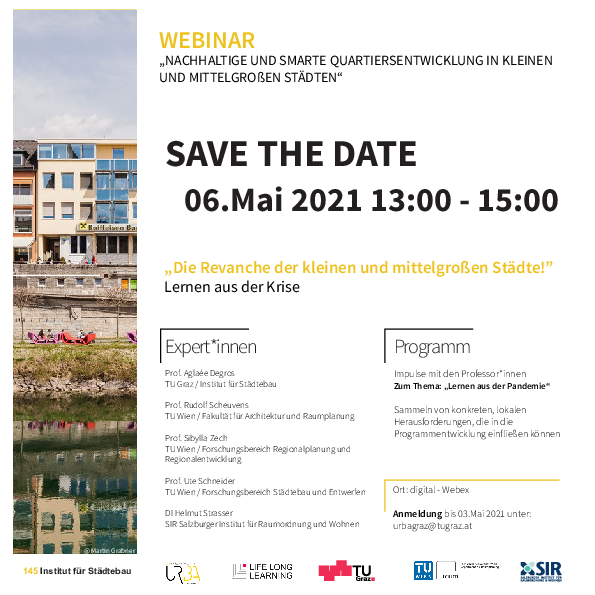
Webinar for sustainable and smart neighbourhood development in small and medium-sized cities.
- Topic: "The revenge of small and medium-sized cities - learning from the crisis".
- In cooperation with TU Vienna and SIR
- 6 May 2021, from 13:00-15:00 hrs.
- Registration at urbagraz@tugraz.at
The webinar serves as preparation for the university course -> www.tugraz.at/go/LLL-SMART
We are experiencing one "crisis" after the next - financial and euro crises, migration flows, climate change and pandemic. These challenges have a significant impact on our cities, communities and our society. In our university continuing education programme "Smart Neighbourhood Development in Small and Medium-Sized Cities", we would like to address the urgent demands of urban development on the ground together with the participants and now invite all interested parties to a non-binding webinar as an information event.
On behalf of Prof. Aglaée Degros from the Institute of Urbanism at TU Graz, we would like to invite you to participate in the webinar "The revenge of small and medium-sized cities! Learning from the Pandemic" on Thursday, 6 May 2021, from 13:00-15:00, to shed light on the path towards climate neutrality, digitalisation and sustainable settlement and urban development together with you and our colleagues from TU Vienna and the Salzburg Institute for Spatial Planning and Housing.
We would like to integrate your experiences and concrete expectations into the programme development of the upcoming University Course and connect them with the thematic framework. More information on the University Course can be found online at www.tugraz.at/go/LLL-SMART or in the attached announcement.
The preparatory webinar offers an information overview on relevant topics and tasks of current urban and regional development and opens a discourse on the question "Learning from the Pandemic". The webinar is aimed at employees in the field of urban and regional development, as well as representatives of political parties.
Participation is FREE OF CHARGE. If you are interested, please send your REGISTRATION by 3 May to urba@tugraz.at.
Urban Move
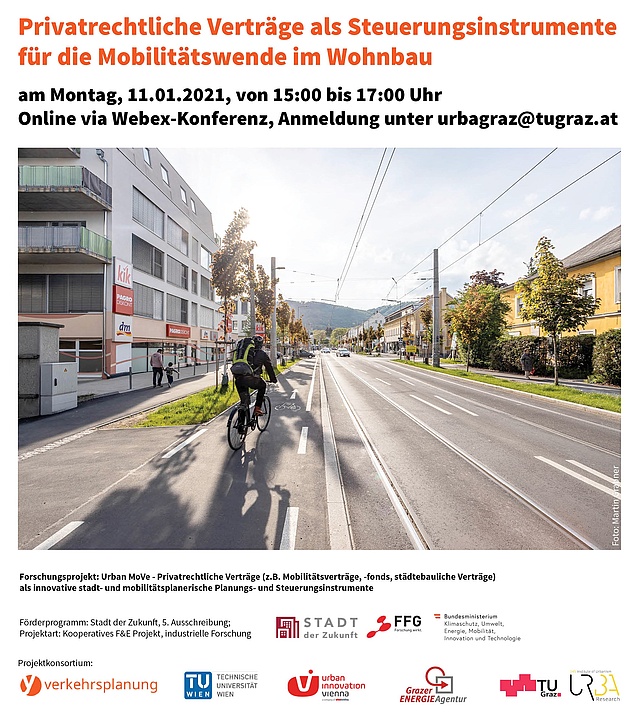
WEBINAR: Private-law contracts as steering instruments for the mobility turnaround in residential construction
The relationship between housing and mobility plays an increasingly important role as a central field of action for climate protection measures. For a holistic climate- and energy-efficient planning of the residential location, an early consideration and co-planning of mobility concerns and innovative mobility solutions is inevitable, since approx. 80% of all trips start and end at the residential location. This is where the choice of means of transport is decided.
Initial experience suggests that positive steering effects can be achieved primarily through contractual arrangements under private law (e.g., mobility contracts, funds, urban development contracts) between municipalities and project applicants (e.g., investors, developers, owners). Currently, however, the development, application and evaluation of contractually regulated steering and planning instruments is breaking new ground both nationally and internationally.
This is where the Urban MoVe research project comes in. With the help of the analysis and evaluation of first practical examples from Graz and Vienna, the research question is pursued to what extent e.g. mobility contracts and funds are suitable as steering instruments for an interlinked and future-oriented urban and mobility planning and how a new and further development of these instruments can look like against the background of mobility innovations (e.g. sharing & electric mobility, mobility as a service, automated driving). Effects and successes of already implemented practical examples are analyzed in Urban MoVe and form the basis for legal, measure- and actor-related as well as process-related new and further developments of the contractual control instruments. First international best-practice considerations complete the picture, which ensures the transferability of the project results.
In addition to a detailed scientific report, the project will produce a practical and application-oriented guideline to support municipalities, developers, mobility service providers and planners in the development, implementation and evaluation of contractual control instruments (e.g. mobility contracts and funds). In the upcoming webinar, we would like to invite a reflection on the findings and discuss them together.
"Reallabor Lincoln-Siedlung, Darmstadt“, Astrid Samaan
„Mobilitätsverträge in Graz“, Barbara Urban
„Sicherstellung von Mobilitätsmaßnahmen in Wien“, Gerald Franz
"Nutzer*innen-Perspektive und Mobilittätskonzept", Mario Platzer
"Rechtliche Herausforderungen beim Einsatz von Mobilitätsverträgen in Österreich“, Kurt Weninger
Call for Proposal
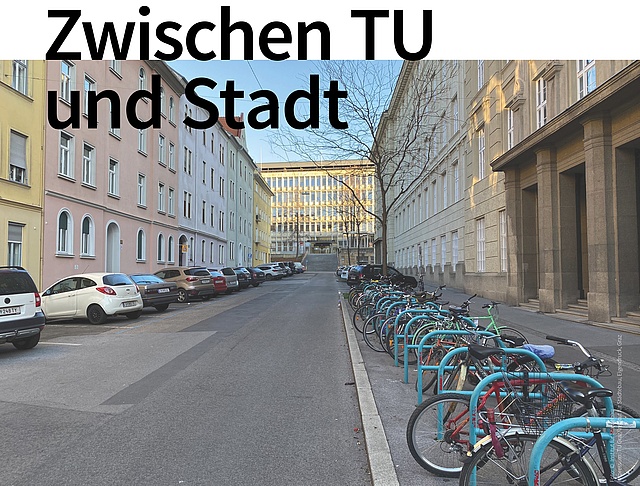
The campuses of the Technical University are embedded in the urban fabric of Graz. For more than 200 years, extensions to the campuses have met the new demands of teaching and research. The (public) open spaces between the buildings and campuses are not unaffected. In the course of the mobility concept of Graz University of Technology, car parking spaces around the campuses were converted into open spaces.
With this Master's thesis, we now want to once again pay special attention to these spaces in between. The surroundings of our campuses "Neue Technik" and "Inffeldgasse" are to be analysed, similar to international examples that connect and promote teaching, research and innovation, and a pedestrian-friendly campus atmosphere is to be developed. Our places of knowledge and exchange should serve the neighbourhood and the public as well as the everyday life of students and staff. Continuous connections between buildings and campuses in relation to corresponding needs can be formative for the designs. In terms of sustainability, upgrading the TU's public forecourts can also fulfil a social responsibility.
Application deadline:
15. March 2021
Documents as PDF by mail to urbagraz@tugraz.at
Guest Lecture
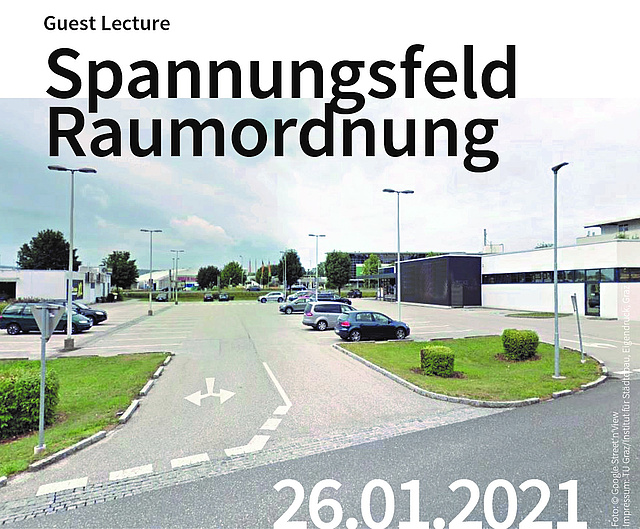
Mag. Andrea Teschinegg
Current challenges for spatial planning in Styria.
Local spatial planning with its planning instruments is one of the most important tasks of the municipalities and is carried out by them in their own sphere of action.
However, the municipalities are bound by the legal and other supra-local requirements, whereby the province of Styria advises and accompanies the municipalities, but also reviews the planning of the municipalities for their legality. This can certainly take place in the area of tension between the settlement policy interests of the municipalities and the legal limits.
In the lecture, on the one hand, the activities of the provincial government as a supervisory authority will be examined in more detail and, on the other hand, the issues the province is currently confronted with in the field of spatial planning (climate protection and expansion of renewable energies, natural hazard management, curbing land consumption, mobilisation of building land, etc.) will be presented.
Andrea Teschinegg is a lawyer and heads the Department of Building and Spatial Planning in the Environment and Spatial Planning Division of the Office of the Provincial Government of Styria.
Where: Virtual Room (Link follows after register)
When: 26.01.2021, 5 p.m.
Registration:
m.haselbacher-berner@tugraz.at
further information:
www.stdb.tugraz.at
www.facebook.com/stdb.tugraz.at
Guest Lecture
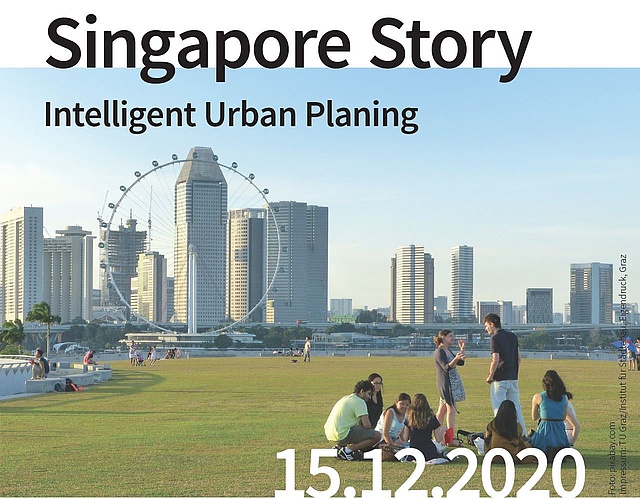
Dr Liu Thai-Ker
Dr Liu Thai-Ker is the Founding Chairman of Morrow Architects & Planners Pte Ltd., providing architecture, urban design and urban planning services. He was the Senior Director of RSP Architects, Planners & Engineers Pte Ltd. (1992-2017), CEO and Chief Architect of the Housing and Development Board (1969-1989), CEO and Chief Planner of the Urban Redevelopment Authority (1989-1992) and Founding Chairman of the Centre for Liveable Cities (2008-July 2020). He is often credited for implementing the successful public housing programme and urbanization of Singapore. For these reasons, since he left the Singapore civil service, he has been invited to plan over 50 cities and many major architectural projects in countries such as China, Russia, Fiji, Saudi Arabia, UAE, Myanmar and Vietnam. Among his various international awards, he has also received The ingapore National Day Award – The Distinguished Service Order, The Singapore Design Council – Golden Jubilee Award and The Singapore Institute of Planners Distinguished Lifetime Achievement Award.
25 years after the British government left Singapore in 1960, the city basically became a modern city by 1985. This transformation was achieved largely due to very well thought out government policies and a systematic urban planning approach. In other words, Singapore’s urban development story was carried out intelligently. This talk is intended to share Dr. Liu Thai-Ker’s experience with the audience.
Where: Virtual Room (Link follows after registration)
When: 15.12.2020, 2 p.m.
Registration:
m.haselbacher-berner@tugraz.at
further information:
www.stdb.tugraz.at
www.facebook.com/stdb.tugraz.at
Guest Lecture
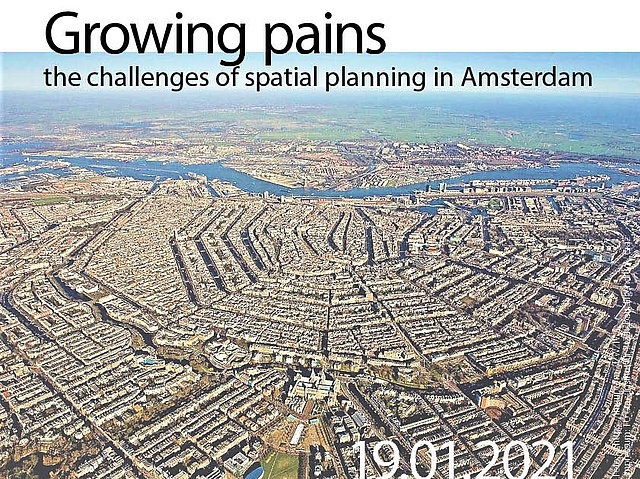
Wouter van der Veur
In his lecture, Wouter will tell you about planning in Amsterdam with a focus on the main challenges in the next decades. Starting with a short insight into the Dutch planning system and tradition he will introduce to you the Structural vision of Amsterdam 2050 with emphasis on its green infrastructure policy. Mobility and public space, „about cycling and fewer cars“, will also be focused on.
By using project examples he will talk openly about the challenges at the implementation
stage and you are very welcome to interact and discuss with him. Wouter van der Veur is Senior City Planner at the Amsterdam Department of Spatial Planning. During his 12 years working for the city he specialized in strategic planning in different fields. He was project leader of important strategic policy documents like the Public Space Vision 2025, the Water Vision as well as the Amsterdam Green Agenda. His most recent occupation was the writing of the Amsterdam Roadmap to Climate Neutrality.
Where: Zoom (Link follows after registration)
When: 19.01.2021, 5 p.m.
Registration:
m.haselbacher-berner@tugraz.at
further information:
www.stdb.tugraz.at
www.facebook.com/stdb.tugraz.at
Guest Lecture
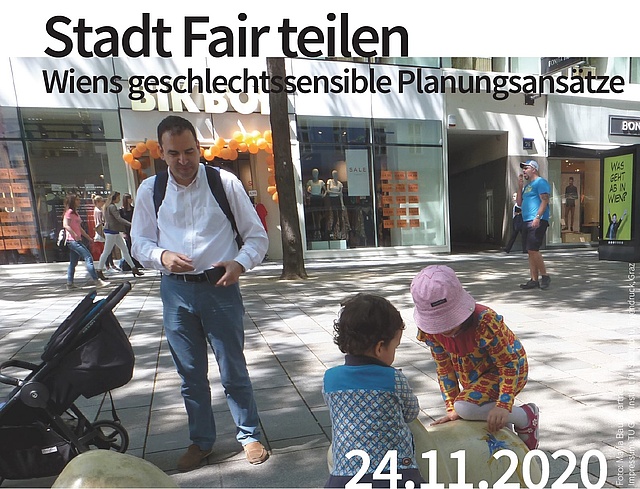
Eva Kail
"Many cities are planned for men rather than women"
However, urban planning should also be based on statistical values. The needs of users have not yet been sufficiently taken into account in the planning and design of public space. (deutschlandfunknova.de) The lecture gives an overview of Vienna's gender planning approaches relevant to urban development and presents important pilot projects, quality assurance model processes and methodological approaches. It will be related to current urban planning "mainstream" issues such as urban development contracts, climate change adaptation, participation. DI Eva Kail is responsible for gender planning in the City of Vienna in the Buildings and Technology Division of the Municipal Directorate. She coordinated over 60 gender-sensitive pilot projects in the fields of housing, urban development, mobility and the design of public spaces and parks.
Where: Zoom (Link follows after registration)
When: 24.11.2020, 1 p.m.
Registration:
m.haselbacher-berner@tugraz.at
further information:
www.stdb.tugraz.at
www.facebook.com/stdb.tugraz.at
Guest Lecture
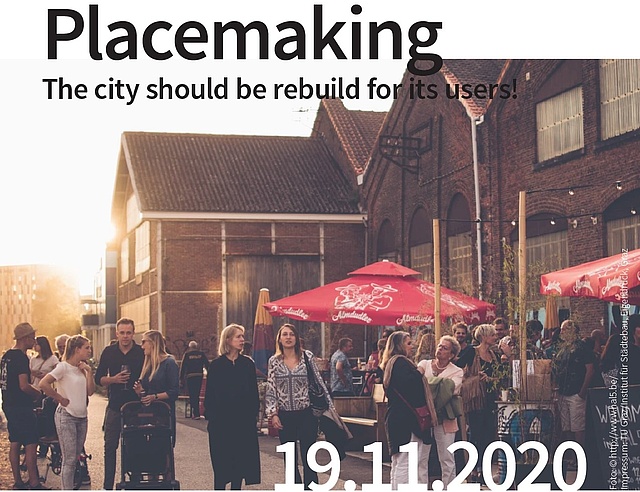
Michiel Van Balen
The Institut für Städtebau invites you to a digital guest lecture by Michiel van Balen from the placemaking office Miss Miyagi. Placemaking is a process in which maximum synergy is sought between the local stakeholders and the qualities and constraints of the built environment. More than a goal in itself, Placemaking is therefore rather a process and a philosophy that can provide strongly anchored projects with a distinct identity and attractiveness without setting the latter as a goal. Miss Miyagi uses her experience in the development, construction and operation of various complex urban programmes to work with her clients to create an interesting and affordable built environment in which our society can develop sustainably. Miss Miyagi specialises in initiating and coordinating ab-normal real estate projects with social added value, developed for and by its end users. This is why Miss Miyagi supports building owners in the realisation of their real estate project, preferably from concept to completion. Miss Miyagi distinguishes itself by its integrated approach to the content project (the ‚software‘) and the real estate project (the ‚hardware‘). This methodical approach will be shown by the projects „De Hoorn“ and „Hal5“.
Where: Zoom (Link follows after registration)
When: 19.11.2020, 1 p.m.
Registration:
m.haselbacher-berner@tugraz.at
further information:
www.stdb.tugraz.at
www.facebook.com/stdb.tugraz.at
Guest Lecture
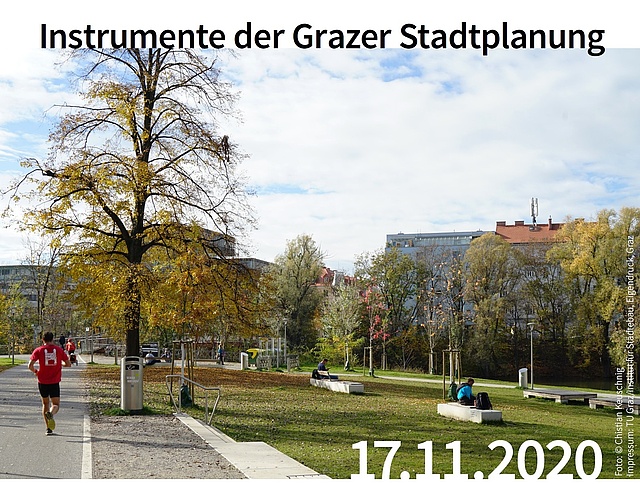
Eva-Maria Benedikt
In which direction will the city of Graz develop? What can spatial planning contribute to the quality of life in our city? What is the role of the citizens? From the point of view of urban planning, what are the major issues and challenges of the future and how will they be dealt with?
The lecture will give a deeper insight into Graz's urban planning, its instruments and tools: the urban development concept, the zoning plan, the spatial model and the development planning. Using current examples, strategies, contents and participation possibilities will be presented and discussed. Eva-Maria Benedikt is an architect, has been working in urban planning since 2005 and has been head of the department of urban development and zoning at the Graz Urban Planning Office since 2015.
Where: Webex (Link follows after registration)
When: 17.11.2020, 5 p.m.
Registration:
m.haselbacher-berner@tugraz.at
further information:
www.stdb.tugraz.at
www.facebook.com/stdb.tugraz.at
Call for Proposal University Assistant
1 position as a University Assistant for 6 years, 40 hours / week, probably 1st December 2020 at the Institute of Urbanism, Faculty of Architecture, University of Technology Graz/Austria.
CODE: 1450/20/020
Deadline for applications: 28th October 2020
Conditions of admission:
Completed master's or diploma studies in architecture and/or urban development and spatial planning.
Desired qualifications:
Affinity to and work experience in the institute's main focus areas of urban development, mobility and public space;
very good knowledge of graphic programs;
proven design qualities;
Experience in the visual communication of research results;
organisational competence;
Experience in the processing and acquisition of research projects desired;
Teaching experience is an advantage;
English knowledge desired;
Interest in a doctoral programme in the above-mentioned institute's fields of specialisation;
Classification:
B 1 according to the collective bargaining agreement for university employees; the minimum monthly remuneration for this use is currently € 2,929.00 gross (14 times a year) and may possibly increase on the basis of theprovisions of the collective agreement by taking into account previous experience in specific activities and other remuneration components associated with the special features of the workplace. Graz University of Technology has the strategic goal of increasing the percentage of women especially in management and academic positions, and therefore explicitly encourages qualified female candidates to apply. Until a balanced proportion of women among the staff has been reached, women having equal qualifications to other candidates will be appointed preferentially. The university does not cover the costs of travel to interviews. Application, CV and other relevant documents should be sent to dekarch@tugraz.at, preferably electronically, stating the exact job title or reference number, and must be received by the end of the application period at the latest.
The Dean: Petersson
Call for Proposal
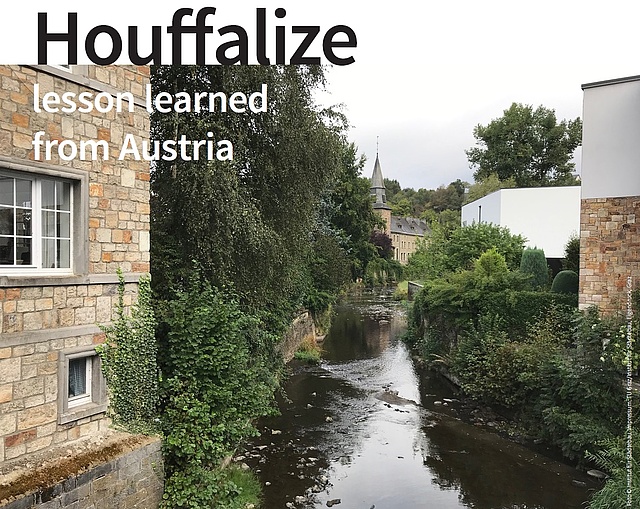
The tourist town of Houffalize is located in the middle of the Ardennes, on the border between Luxembourg and Belgium. The town, with just over 5000 inhabitants, would like to orientate its further development more towards the Ourthe Orientale river and focus more on active mobility. The St. Catherine's Priory, founded in 1243, and facilities in the town are to be restructured and new forms of housing developed.
The tendered Master's thesis is to develop a transformation strategy for this, referring to Austrian best practice examples and building on the results of the participatory workshops already held in the town.
In the development, Austrian good practice examples from rural areas will be used and different concepts will be reinterpreted in Houffalize.
Application deadline:
15 November 2020
Documents as PDF by mail to urbagraz@tugraz.at
Call for Proposal
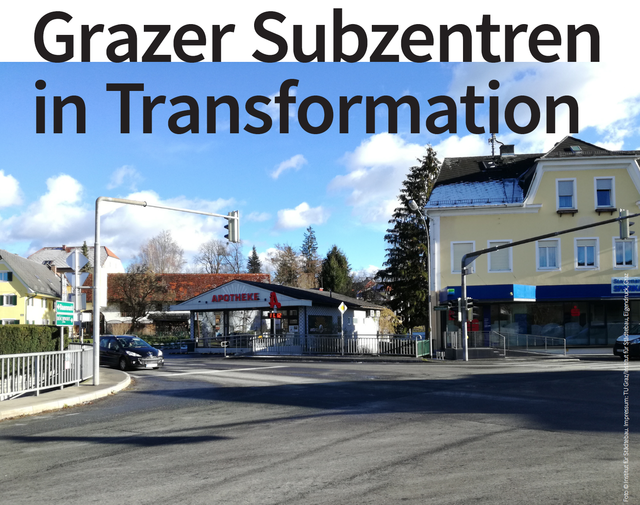
Subcentres are centers of urban life, which appear in many different forms: Where historical settlement centers once formed a center and generated a trading place and meeting place, today mostly motor vehicle traffic dominates. However, the quality of public spaces in the Graz suburbs of Andritz, Straßgang, St. Peter, etc. has a decisive influence on the quality of life of their inhabitants. The historical centers of these districts, which are often hardly usable at present, have the chance to become identity-forming spaces of public life!
The promotion of environmentally friendly forms of mobility and an increase in the quality of life are key aspects in their development. The networking of the sub-centres with each other and the problems arising from the settlement of large-scale retail trade are also central challenges. What does a subcentre need? What functions and design requirements must these central locations of the sub-center fulfill? How can functional centers be established and promoted? The result of this study is the location of the Graz sub-centers, the analysis of their urban development significance and the range of public spaces and infrastructures they offer. In addition, recommendations for action or drafts for their transformation into identity-forming district centers with a quality of stay will be developed.
Application deadline:
15 November 2020
Documents as PDF by mail to urbagraz@tugraz.at
Call for Proposal
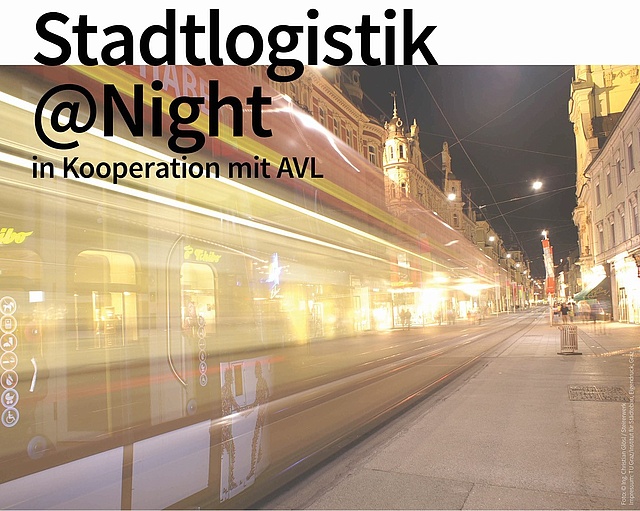
As deliveries of goods and commodities for everyday and specific needs are becoming more and more common, hubs at good locations in the city, from which the supraregional supply streams are collected and redistributed, are a sustainable alternative. Neighbourhood or district distribution centres are addressed by load wheels and micro-logistics systems and offer the possibility of a more fluid and controlled delivery traffic, especially outside the usual rush hours. Deliveries during the night hours disentangle the daily peaks in delivery traffic, and in addition, individual traffic at this time of day is hardly relevant. Therefore, the efficient use of existing infrastructure is ideal when fast bike connections transform into logistics routes within the city, for example.
Therefore, the first step of the project is to develop an atlas for urban logistics applications with short distances at night and to find criteria for the planning. A further task is to find and plan a pilot for the application. This is to be defined with details for implementation. Adjustments of building structures, approaches to solving problems and conflicts that arise as well as general effects, spatial expansion and urban sociological consequences of such concepts are to be dealt with.
In this master thesis AVL GmbH is available for the informative exchange of technical requirements, for example for infrastructure.
Application deadline:
15 June 2020
Documents as PDF by mail to urbagraz@tugraz.at
Bildcredit: Photo & Travel magazine mypics.at
Elective
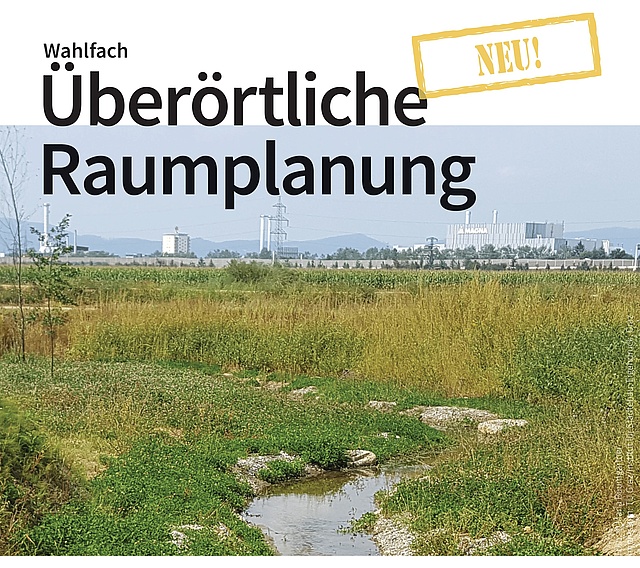
Regional spatial planning and development planning - bilingual lecture
What is regional planning and development ? Which methods and planning instruments exist at regional, national and transnational level? How do regional environmental factors and EU directives play into concrete projects? Who are the acting actors? What is the role of public participation and planning transparency? How can I make a contribution to sustainable regional development?
Starting from their own region of origin, students learn the basics and instruments of regional and development planning in Austria and the EU. They deal with current challenges at the regional level and the possibilities of influencing them.
"Think globally, act locally!" is the motto.
The lecture concludes with the preparation of a press release about their own region of origin.
The successful completion of the course is a qualification for independent work in regional planning.
Elective
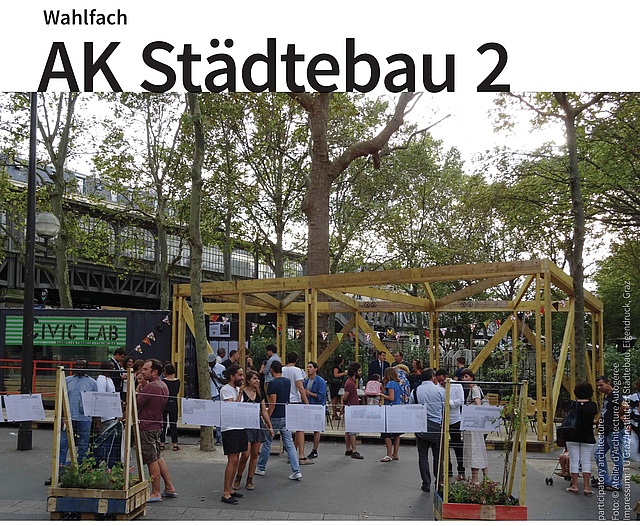
Citizens in urban development: partner or opponent?
For the success of urban development projects it is crucial to involve citizens from the beginning to the end. But how can this be done without the effort exploding? How can citizens become partners of the architect and not opponents?
This time the working group Urban Development 2 offers the possibility to try out citizen participation. Based on selected quarters in various districts of Graz, fictitious projects will be played out and stakeholders will be actively involved on site. The aim is to identify the opportunities and risks of participation and to be able to apply these to your own projects later on.
Christian Kozina from the Regional Centre for Sustainability (Graz University) is an expert in transdisciplinary participation processes. He is currently organising the Graz citizens' conventions as part of the Cultural Year 2020.
Bauaustellung Wohnen 4.0
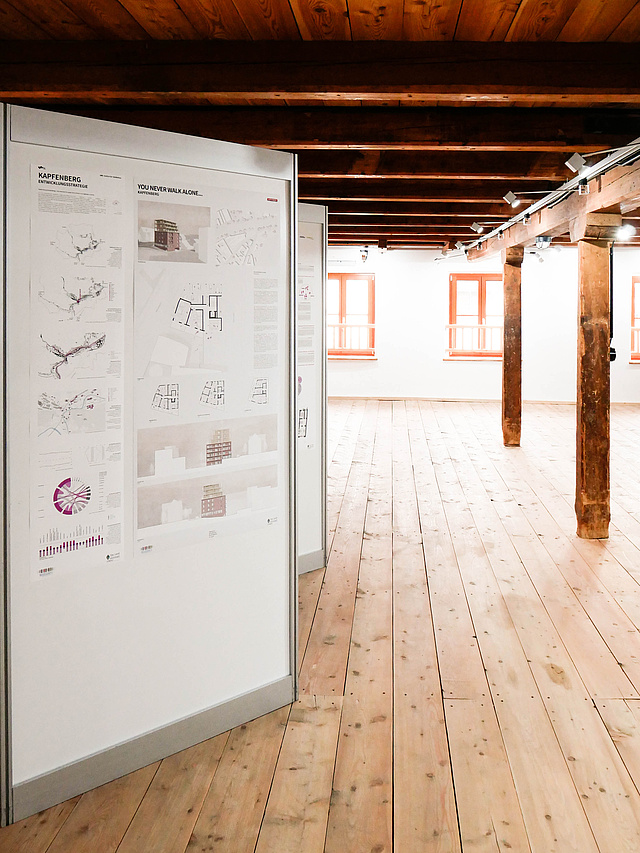
03 February - 14 April 2020
The project Wohnen 4.0, funded by STLReG 2018 & 2019, focuses on combinations of living, working and living in order to strengthen the quality of life in eastern Upper Styria and its existing potential.
The project was initiated by the Regional Management Upper Styria East and was worked on jointly by the Institute for Urban Development of Graz University of Technology and Raumplanungs- und Stadtentwicklungs GmbH.
On the basis of extensive surveys, a general strategy for the development of the region was worked out, which focuses on strengthening the centre and conversion, mobility, accessibility and a diversification of housing forms.
A touring exhibition was organised in cooperation with architects and planners of the pilot projects in five municipalities in Upper Styria that were developed as part of the Housing 4.0 strategy.
Every 2-3 weeks, the informative exhibition will change its location a total of four times within the Upper Styria East region.
Trofaiach
"Rethink the meaning of the main street in Trofaiach"
03.02. - 16.02.2020
Simon Mühle | Rossmarkt 6, 8793 Trofaiach
Kalwang
"Develop Kalwang as an attractive place to live for all generations"
17.02. - 01.03.2020
Kulturzentrum Fohlenhof | Fohlenhof 1, 8775 Kalwang
Kapfenberg
"To make Kapfenberg attractive and accessible as a place of education and living for young people"
16.03. - 29.03.2020
Durchgang zur Abt. Baudirektion
Schinitzgasse 2 | 8605 Kapfenberg
St. Stefan ob Leoben
"Strengthen the town centre in St. Stefan o. Leoben as a place to live and work"
30.03. - 13.04.2020
Gemeindesaal im Amtshaus
Dorfplatz 14 | St. Stefan ob Leoben
Call for Proposal
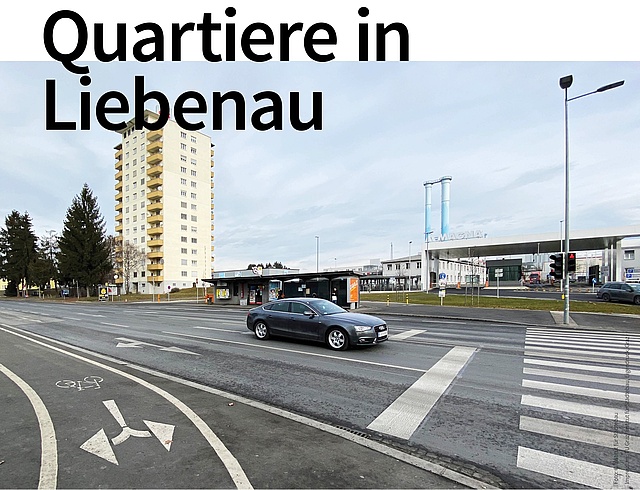
The accessibility of the large company Magna-Steyr with its thousands of employees demands the infrastructure of the core conurbation of Styria. Forecast expansions and densification in the urban area offer new arrivals to this suburban location of Graz a special potential between the inner-city advantages and the proximity to peripheral recreational opportunities. Between the river Mur and the Raaba railway station there are prominent areas where large-scale business and technological aspects mix with small-scale residential structures. Commonly used spaces offer space for both actors, cooperative overcoming of barriers creates active connections through otherwise closed areas and streets. Liebenau offers a diverse and lively coexistence between Murpark, the southern belt, Magna-Steyr and the motorway.
The definition of functional mixes in the Liebenau district of Graz with sufficient density, the design and distribution of open space qualities as well as visionary urban development are the main focus of the work. New neighbourhoods in the border area between the large company form and the small living areas all around are to enhance the Liebenau district in the south with diverse functions and qualitative spaces and strengthen neighbourly relations.
Application deadline:
28. February 2020
Documents as PDF by mail to urbagraz@tugraz.at
Lunch Lecture
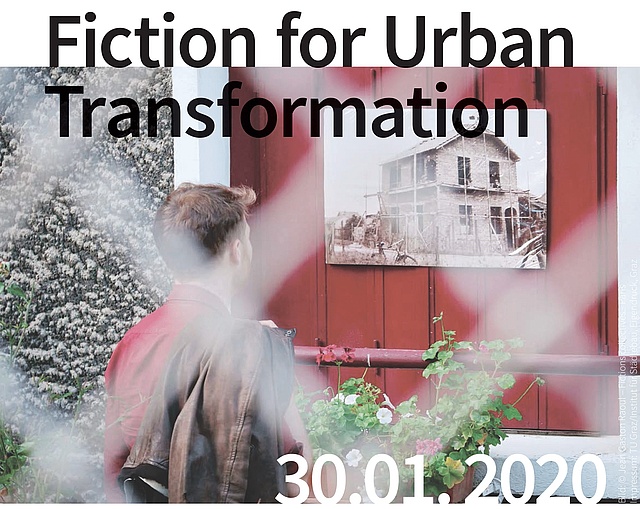
The Institute for Urbanism invites to a Lunch Lecture by Carole Schmit.
The lecture offers a view on the power of hierarchies at play in contemporary metropolitan landscapes. By understanding how fictions change (the perception of) the real, architects can redefine their role in the processes of urban transformation.
By introducing a variety of fictional approaches as strategic tools for emancipating spaces and communities new forms of spatial domination emerge. A series of examples in Luxembourg and abroad will explicit her approach.
Carole Schmit currently teaches as a Guest Professor at the University of Luxembourg where she had been in charge of the development of the new Master in architecture. At the same time she is working for the Administration of Public Works on strategic state projects.
For about fifteen years she has developed in her office Polaris for her design and research projects an architectural syntax based on the influences related to street culture, conceptual art and anthropological studies.
Where: HS II
When: 13.00-15.00
Registration until 28.01.2020 at k.herrmann@tugraz.at
further information:
www.facebook.com/stdb.tugraz.at
Lunch Lecture
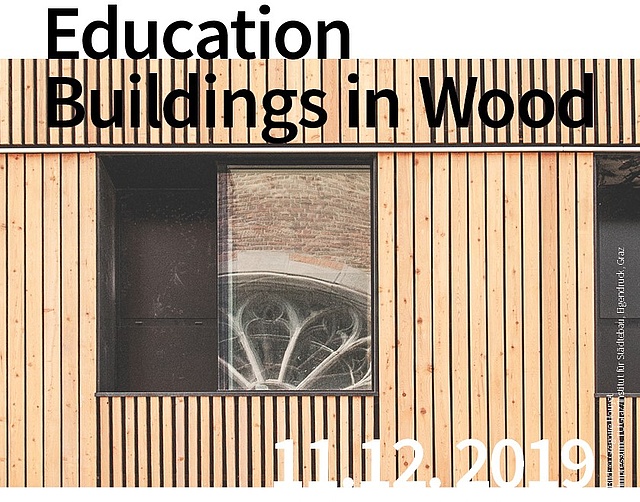
The Institute for Urbanism invites to a Lunch Lecture by Grégoire Houyet from Atelier 229 Architects in Brussels (Belgium).
Through the description of several projects, the lecture will highlight the relevance of the use of wood in educational buildings.
The studio’s production is based mainly on sustainable public projects. “Pragmatism – rationalism” are the words they describe their work. The architecture aims to be pure and simple, avoiding any free architectural gesture.
In constant research, they emphasizes repetition rather than exception, development rather than testing, the duration to the event, common sense to sophistication.
A229‘s sustainability approach has to be taken in an holistic way and includes urbanism, mobility management, accessibility for all, efficient use of energy and water, responsible use of materials, maximum flexibility, and anticipation of a minimal maintenance.
Grégoire Houyet studied Architecture in Canada and finished his studies in Brussels (Belgium). He was cofounder of Atelier 229 Architects in 2005.
Where: HS II
When: 13.00-15.00
Registration untill 09.12.2019 at k.herrmann@tugraz.at
further information:
www.facebook.com/stdb.tugraz.at
Lunch Lecture
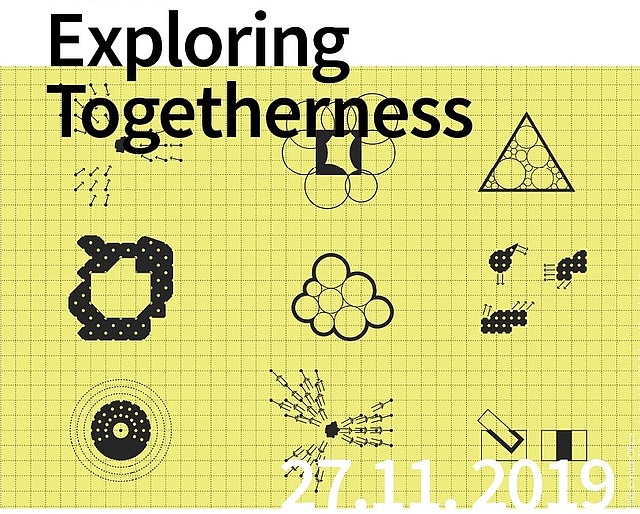
The Institute for Urbanism invites to a Lunch Lecture by Katerina Psegiannaki from KUNE Architecture Office in Madrid (Spain).
„In this Lunch Lecture we would like to deepen in the main philosophy of our practice that explores the architectural approaches and interpretations of togetherness.
Our research wants to reinforce forgotten mechanisms, politics and institutions that would transcend 20th century architecture centred on image and monumentality.
Its main purpose is to foster a 21st century architecture and urbanism which emphasizes and revolves around every day synergies, rituals and cooperation, encouraging people to share, connect and collaborate while considering domestic, urban, natural and digital environments as essential extensions of human relationships.“
Katerina Psegiannaki is a PhD Architect teaching Urban Management and Digital Arts in the UCJC University in Madrid. She works as an independent architect in KUNE Office whose main practice focuses on exploring the architectural possibilities of being together. Since 2009 she is a founding member and co-director of HipoTesis magazine.
Katerina Psegiannaki
Where: HS VI
When: 12.00-14.00
Registration until 26.11.2019 at k.herrmann@tugraz.at
further information:
www.facebook.com/stdb.tugraz.at
Book presentation
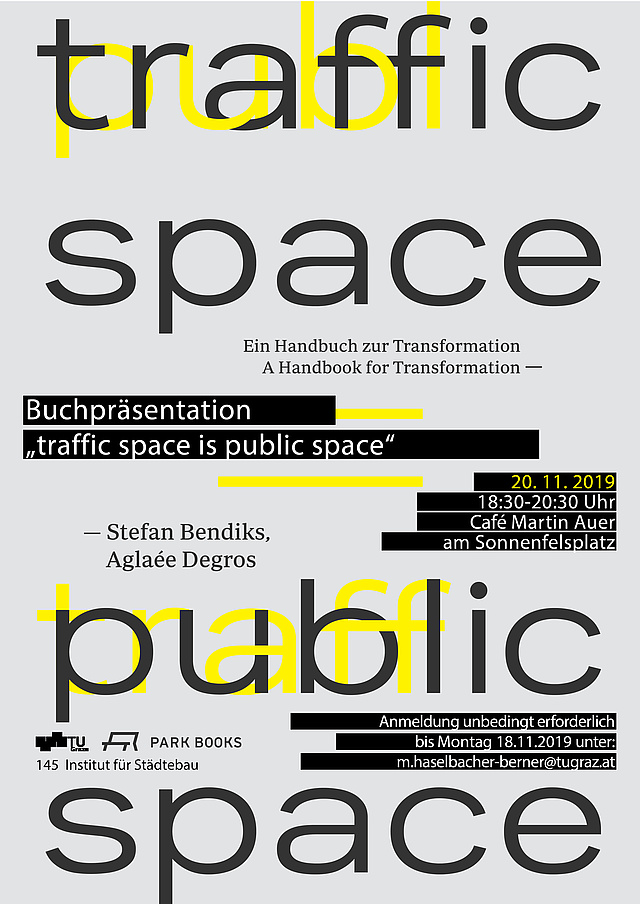
Traffic Space is Public Space
Book presentation 20.11.2019
Stefan Bendiks/Aglaée Degros
Zurich: Park Books, 2019
German/English, 224 pages, softcover
ISBN 978-3-03860-165-4
EUR 38.00
Order by publisher
Public space is essential to vital cities and inclusive, resilient societies. But how might we create more of it in our densely packed cities? The solution is lying before us: the vast amount of space that can be reclaimed by transforming areas dominated by cars and now congested with traffic into truly public spaces. But before we can do that, we must work toward a better balance between mobility and place: more room for pedestrians and cyclists, much less for cars and trucks transporting both people and goods.
Traffic Space Is Public Space is no traditional book on planning principles in urban design. It won’t give you a rigid set of rules. But it will introduce you to new approaches and strategies to trigger change: networking, shared use of space, a circular urban metabolism and the revitalization of local economies, a participative process involving local businesses, and an appropriate aesthetic.
Packed with inspiring projects from around the world, including some from the authors own urban planning and design firm, Artgineering, Traffic Space Is Public Space offers forward-looking insights into how we can increase the quality of space and thus life in in our cities.
Stefan Bendiks is an architect and urban designer, and co-founder of Brussels-based planning and research firm Artgineering. He also lectures at various European universities.
Aglaée Degros is an architect and urban designer, and a founding partner of planning and research firm Artgineering in Brussels. She also teaches as a professor at the Institute of Urbanism, Graz University of Technology.
Where: Café Martin Auer am Sonnenfelsplatz
When: 18.30-20.30
Registration until 18.11.2019 at: m.haselbacher-berner@tugraz.at
Call for Proposal
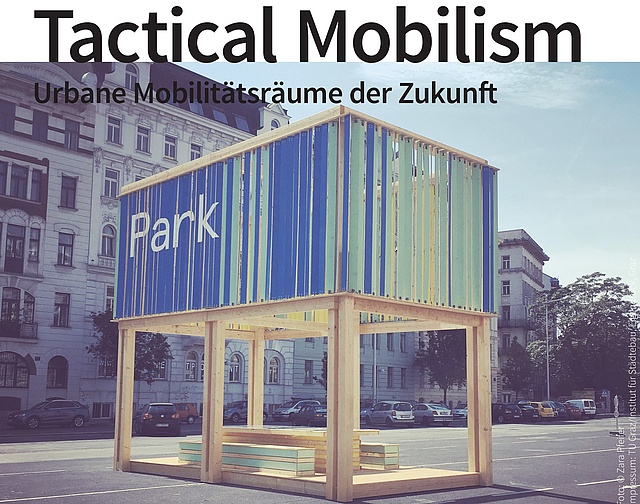
The public spaces of most European cities are still designed in favour of motorised private transport. Traffic areas are almost exclusively oriented towards motor vehicle traffic and even potential recreation areas are increasingly being used as parking spaces for cars. This continuing trend reduces the functionality of public space as a meeting point, lounge and space for active mobility. At the same time, social participation in public life is made more difficult and the use of sustainable forms of mobility is reduced.
The Tactical Mobilism project aims to develop time-limited, simple and cost-effective interventions in the transport sector that make public space usable again as such.
For this purpose we are looking for Master students who want to deal with the development, design and implementation of such interventions for the twin city Villach as well as the elaboration of prototypical and transferable intervention categories for other cities.
Application deadline:
16th december 2019
Call for Proposal
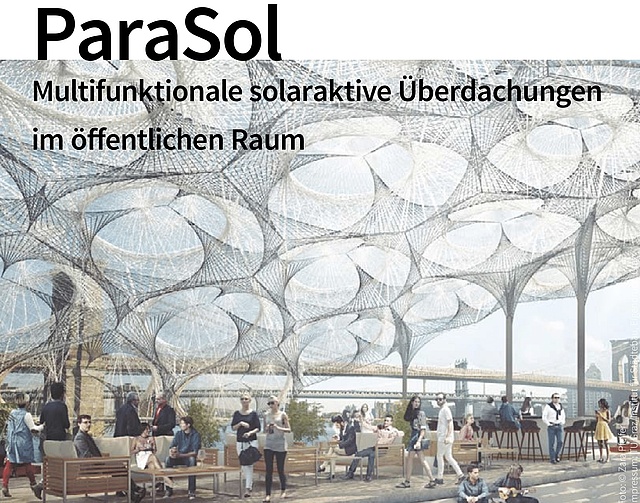
A considerable part of our cities is occupied by areas of moving and stationary traffic. Outdoor parking spaces in particular are highly unecological, space-intensive, mostly monofunctional and often used only part-time. They seal the floors, promote summer overheating and have no added value for city dwellers. At the same time, energy efficiency and climate objectives can no longer be achieved without the inclusion of public spaces. How can such deficient urban areas be transformed into functionally and spatially valuable, superimposed urban spaces through solar-active roofing and innovative street furniture? The focus will be on the qualitative exploration of advantages and disadvantages for urban space and cityscape:
- Evaluation and definition of architectural and urban framework conditions, objectives and potentials
- Development of prototypical creative solution variants
- Location and description of functional synergy potentials
We are looking for Master's students who, using the example of concrete public spaces in Leoben, are investigating the effects that newly developed, solar-active square and street roofings have on the cityscape and urban function and which further synergies they bring with them.
Application deadline:
16th november 2019
Lunch Lecture
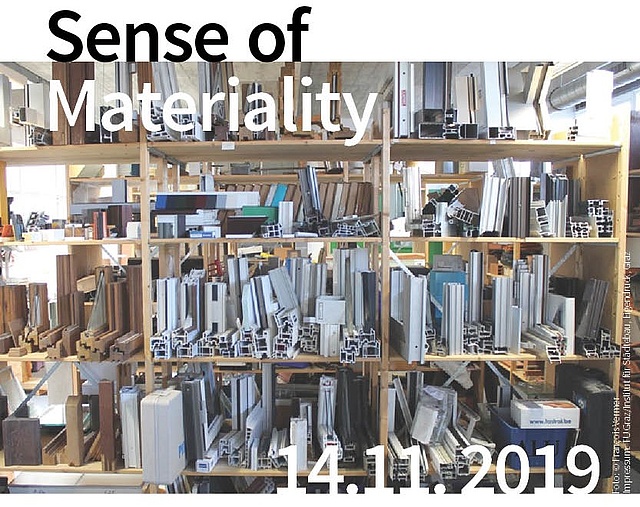
How to stimulate the sense of materiality by students with the help of a board game about architecture and the construction?
The Institute for Urbanism invites to a Lunch Lecture by François Vermer.
On one hand his lecture will focus on the «material library» organized by him, which is a place for students attending this faculty to have a direct «skincontact». They can feel, touch and weigh the materials used for outdoor design, buildings as well as the main constructive systems of them.
On the other hand he will explain the «board game» they have developed to help young people and students to experience the everyday reality of young working architects. This role play is an opportunity to learn about the fascinating world of urban design, architecture and renovation.
Since 2008 François Vermer is been teaching in ISA-Saint-Luc (Brussels, Belgium) in two different topics : Topography and Earth Sciences (geology and the use of rocks in architecture mostly). He coordinates togehter with his colleague J. Malevez the «material library» of the Faculty of Architecture, Architectural Engineering and Urban Planning (LOCI, UCL).
François Vermer
Where: HS V
When: 11.30-13.30
Registration until 12.11.2019 at k.herrmann@tugraz.at
weitere Informationen:
www.facebook.com/stdb.tugraz.at
Lunch Lecture
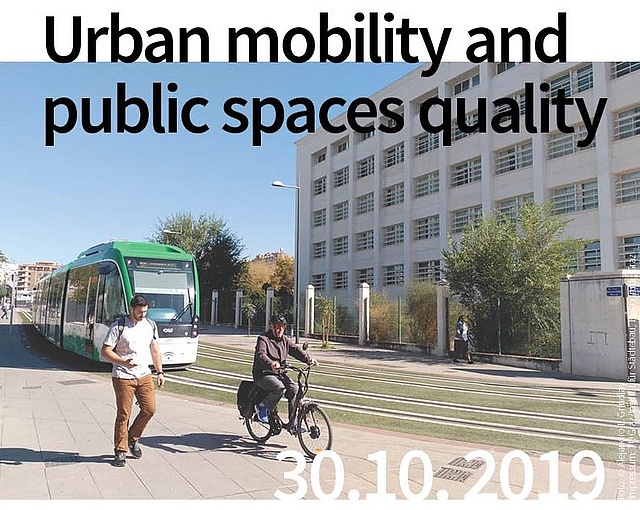
The institute for urbanism invites to a lunch lecture by Prof. Alejandro L. Grindlay.
He lectures and conducts research at the University of Granada (Spain) where he also did his Master degree in Urban Planning and Management in 2005. His lecture will focus on the relation between urban mobility and public spaces: The urban mobility has a strong influence in the quality of the urban public spaces.
The higher quality of the urban public transport system implies a higher quality of the urban public spaces. Great investments in public transport systems are generally associated with urban renewals. The limitation of private motorized transport gives more space for pedestrians and better environmental quality. However the motorization figures are still growing and new electric vehicles won’t solve the problems linked to the limited urban space.
There are numerous examples worldwide showing the great urban changes given by the promotion of a more sustainable mobility. Many Spanish cities, such as Granada, have some places linked to different mobility environs and exemplifying those facts.
Alejandro Grindlay
Where: HS II
When: 12.00-14.00
Registration until 28.10.2019 at k.herrmann@tugraz.at
more information:
www.facebook.com/stdb.tugraz.at
Why We Cycle
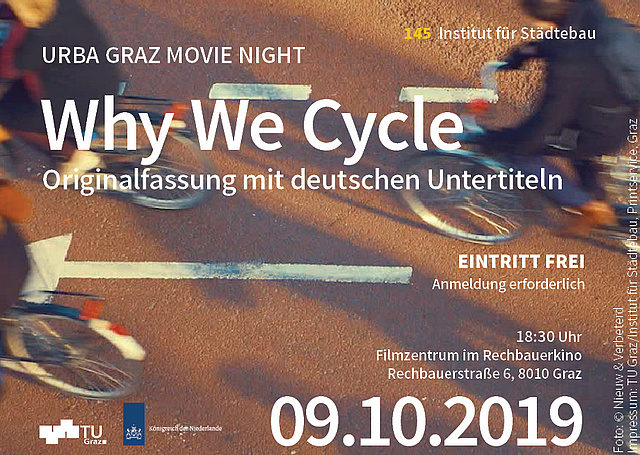
To the Dutch, cycling is as normal as breathing. We don’t think about it, we just do it. Perhaps the fact that we don’t think about it, is the key to the bicycle’s success in this country. But because we do not give cycling a second thought, we don’t really know what the deeper needs of cyclists are. In the documentary ‘Why we cycle’ we take a ride with ordinary cyclists and specialists from a variety of disciplines. These conversations uncover some obvious, but even more hidden effects of cycling on people, on societies, and on the organization of cities.
The event is made possible by the kind support of the Embassy of the Kingdom of the Netherlands in Vienna. The film will be shown in its original version with German subtitles.
Where: Rechbauerkino, Rechbauerstraße 6, 8010 Graz
When: 09.10.2019, 18.30 Uhr
Entry: FREE, registration at the Institute of Urbanism required
more information:
https://www.facebook.com/events/404346896943376/permalink/405420943502638/
GRAZ OPEN ARCHITECTURE 2019
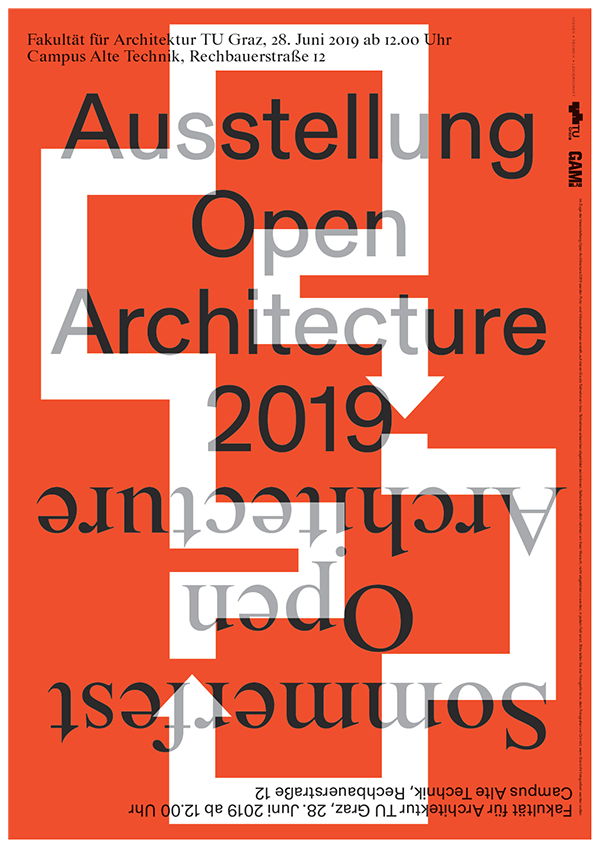
"GRAZ OPEN ARCHITECTURE" enters the 6th round: The Faculty of Architecture of Graz University of Technology invites you to its annual summer party on 28 June 2019 and to the exhibition of your final theses.
further information:
www.tugraz.at/fakultaeten/architektur/aktuelles/veranstaltungsreihen/sommerfest-und-ausstellung/
www.facebook.com/events/467474720665256/
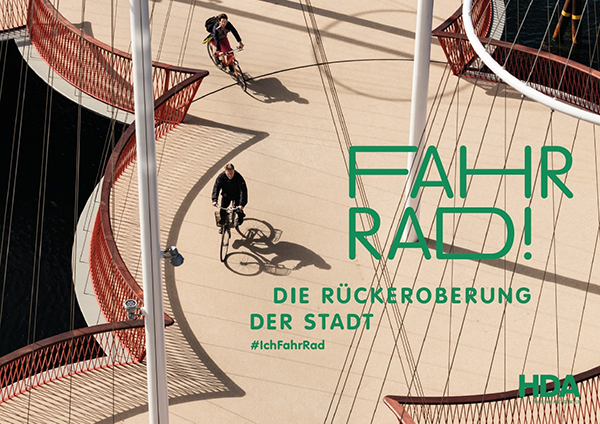
What can urban development look like to attract even more people to the bicycle? With project examples from all over the world, the exhibition Fahr Rad! promotes the gentle reconquest of the city and shows how the road to an ecologically, economically and socially sustainable environment can also lead through the planning of cities and towns suitable for cycling.
Solutions from the cities of Copenhagen, Groningen, Barcelona, New York, the Ruhr area and Oslo will be shown. In addition, the situation of bicycle traffic in Graz and Styria will be referred to.
The Haus der Architektur does not only want to approach the subject of bicycles as a means of transport, but also to deal with the extent to which the confrontation with contemporary urban mobility creates opportunities to discover public space as a new resource. The aim is to rearrange the public space and thus the street space for use by all and to distribute its surfaces in such a way that safe, comfortable and balanced mobility is possible for all people. The exhibition also aims to stimulate an inclusive debate and encourage exchange and cooperation between different actors.
Exhibition opening: 28.05.2019, 19 Uhr
Exhibition duration: 29.05.-14.08.2019
Opening hours: Tues-Sun, 10-18 hrs
Europan Austria
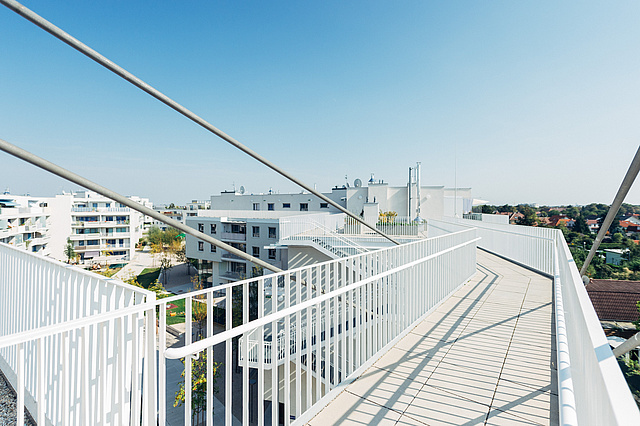
Europan – An innovative idea competition for young architects and urbanists under the age of 40
What: Lecture by Katharina Urbanek
When: Wednesday, 06.03.2019, 6pm
Where: Rechbauerstraße 12, 8010 Graz, HS VIII
After the lecture we can offer a lively discussion and free beer.
New Lecture
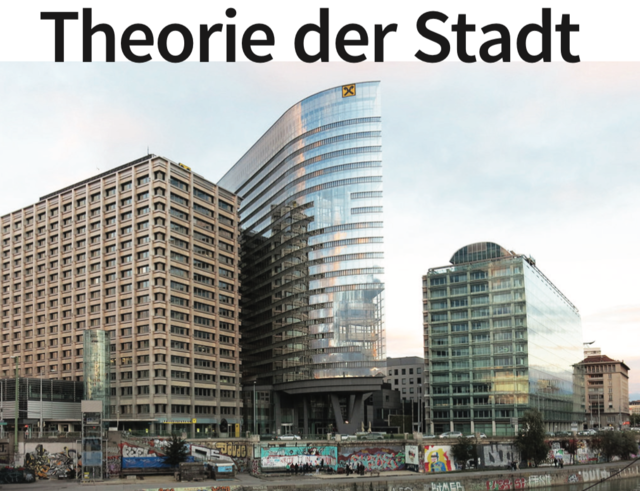
A theory of the city must attempt to grasp the sphere-forming elements of urban space and at the same time contain the ideas as well as the social motivational structures. Both result in the actions of the city's inhabitants, who weave the invisible symbolic net that lies above the city. The morphology of the city gives us an image of the cultural, social and political structure and history. All together, the ideas, the actions, the forms, result in the material for the discourse of the urban, which comes from the past and will guide us into the future and accompany us incessantly.
The LV deals with a wide range of topics: city as an idea, anthropology of settlement, transition zones, sacred and profane spaces, modern city, connection between urban morphology and society, urbanity, integration.
Famous thinkers from the city of Charles Baudelaire, Walter Benjamin, Georg Simmel and Henri Lefebvre, Lewis Mumford to contemporary sociologists and philosophers such as Richard Sennett and Peter Sloterdijk will also be discussed.
Lecturer:
Manfred Russo
Institute of Urbanism
Rechbauerstraße 12/II
8010 Graz
- Phone
- ++43/316 873-6286
- Fax
- ++43/316 873-6280
- urbanism@tugraz.at
- Office hours
- Sprechstunden Mo-Do: 9-12 Uhr
